Blog
Breach Of Contract: “Rescission” As A Remedy For Breach Of Contract
We lawyers at McGrath and Spielberger, PLLC deal with contracts every day. Unfortunately, that sometimes includes breaches of contract, whether due to a missed deadline or something else. Sometimes the breach is harmless, whilst other times it is devastating; most of the time the consequences are somewhere in between those 2 extremes.
A party who has been legally injured to the other party’s breach of contract (whether related to a missed deadline or not) can seek a “remedy”. Remedies are ways in which such an injury can be corrected or compensated for, and/or a way to enforce contractual rights.
One of the ways in which a wronged contractual party may be able to correct a legal injury is called “rescission”. Rescission generally attempts to put the parties back into the position they were in before the contract and breach of contract, with a focus on trying to undo (or compensate for) damages suffered by the party not in breach of contract.
For example, if the Seller under contract to sell real estate (real property) breaches the agreement by refusing to go forward and complete the sale, the would-be Buyer may have the right of rescission. This could include the right to recover any monies paid to Buyer or put into escrow (such as down payments, deposits, and good faith monies) and to be reimbursed by Buyer for actual costs expended or incurred (such as inspection fees).
Other terms and phrases often associated with rescission are to “unwind the contract” or “void the contract” and “make the parties whole”.
The “right of rescission” may be specifically stated in a legal agreement, but often is not. It is an established remedy which courts can order in appropriate circumstances.
It is rare that rescission is the only possible remedy available for an injured party, but sometimes a party may need to choose to seek rescission instead of another type of remedy.
As you may guess, rescission is not always possible or practical.
You may have the right to rescission and that may be the remedy you should seek. Parties who have been legally injured by a breach of contract should discuss their options with a lawyer and then determine the best route forward, which may or may not include the remedy of rescission.
Don’t hesitate to contact us for contract law services, such as drafting, editing, analyzing, negotiating, and disputes.
Breach Of Contract Remedies: The Other Party Breaches The Contract – What Can You Do?
We lawyers at McGrath and Spielberger, PLLC deal with contracts every day. Most of those legal agreements have at least one time deadline, while some contracts have numerous deadlines.
Parties to contracts miss deadlines every day, and often those missed deadlines are a breach of the contract. Sometimes the breach of contract is harmless, whilst other times it is devastating; most of the time the consequences are somewhere in between those 2 extremes.
For discussion purposes, let’s assume the other party has missed a contractual deadline or otherwise breached the contract. What can you do – what are your “remedies” ? Keep in mind that what you can do may be quite different vs. what you should do (what you should do will be the topic of a separate article).
Typically, your remedies include any which are specifically stated in the contract and/or any which are generally available under the law. Some legal agreements specify what the remedies are (or may be) upon a breach of contract such as a missed deadline, while some do not. Contracts which do list specific remedies may state that the injured party only has that remedy, or may not have that restriction.
Here is a list of some (not all) of the more common and important ways in which a wronged contractual party may be able to correct legal injuries and/or enforce contractual rights; some of these may have their own linked articles which explain them in greater detail. The right to:
- be put back into the same position (or as close to it as possible) as you were in before the contract and the other party’s breach of contract (“rescission”);
- terminate the contract;
- not perform one’s own duties under the agreement (be careful with this);
- pay a lesser amount to the other party, if the contract involved paying the other party (be careful with this);
- recover actual monetary damages suffered due to the missed deadline;
- a pre-determined monetary amount as stated in the contract (“liquidated damages”);
- obtain a legal order which prevents the other party from doing something (an “injunction”);
- obtain a legal order which requires the other party to perform under the contract (“specific performance”); and
- recover certain legal costs and fees from the other party.
Sometimes, you can only utilize 1 of these remedies, whereas other times you can utilize more than 1. In a lawsuit, a party may initially seek more than 1 type of remedy, even if that party might, at trial, have to “elect which remedy / remedies” vs. continuing to pursue all of them.
It’s important to have a lawyer who has the experience and knowledge to guide you through your possible remedies for breach of contract. We have that experience and knowledge.
Don’t hesitate to contact us for contract law services, such as drafting, editing, analyzing, negotiating, and disputes such as those involving a breach of contract.
Contracts And Deadlines: Missing A Contractual Deadline
We lawyers at McGrath and Spielberger, PLLC deal with contracts every day. Most of those legal agreements have at least one time deadline, while some contracts have numerous deadlines.
How often does a party to a contract miss a deadline stated in the agreement between the parties? It happens many times, every single day. What a party under contract can do and/or should do related to a missed deadline is impacted by many factors. Let’s examine some of the key factors, raised in the form of questions below.
- Did you miss the deadline, or did another party to the contract?
(For purposes of the remainder of this article, let’s operate as if the other party missed the deadline.) - Did the other party give you advanced notice that the deadline would be missed and/or a reasonable explanation as to why?
- As discussed in another one of our articles, was the deadline stated in the contract to be one for which “time is of the essence”?
- Is the fact of the missed deadline particularly important, including whether it has caused or is causing significant, measurable damages to you?
- Have you provided formal, written notice of the missed deadline, perhaps including that the same is a breach of contract?
- Is there a time period in the contract during which the other party can “cure” the problems caused by the missed deadline and/or cure a breach of contract?
- Do you want – or need – the relationship with the other party to continue?
- If significant damages have been caused, is there a way to fix that without the situation becoming adversarial, including without threat of a lawsuit or an actual lawsuit?
- Does the missed deadline impact your duties under the legal agreement, possibly including whether you are still required to carry them out or the timing of doing so?
- Does the contract specifically state what the consequences are or might be due to such a missed deadline, or perhaps due to a breach of contract in general?
- Is the situation serious enough, potentially including the amount of damages caused, for you to retain (and pay) a lawyer?
The answers to these and other questions will play a crucial role in determining: (1) what you can do; and (2) what you should do. Your possible options are the subject of a related article by our law firm.
Don’t hesitate to contact our law firm for contract legal services, such as drafting, editing, analyzing, negotiating, and disputes.
Contracts And Deadlines: Time Is Of The Essence
We lawyers at McGrath and Spielberger, PLLC deal with contracts every day. Most of those legal agreements have at least one deadline, while some contracts have numerous deadlines. A related article by us discusses types of contractual deadlines.
An important aspect of contractual deadlines is whether “time is of the essence”. Any deadlines, dates, time periods, etc. in a contract are more likely to be enforced very strictly if the agreement states that “time is of the essence” regarding same.
Let’s suppose a Service Provider has not completed the contractually-obligated Services within the required time frame, and let’s compare and contrast these 2 different versions of the deadline in the business contract.
(Version A) Service Provider shall complete the Services no later than 90 days after Company provides the Data.
vs.
(Version B) Service Provider shall complete the Services no later than 90 days after Company provides the Data, with time being of the essence.
The entire circumstances are always taken into account when applying the law or a legal agreement to the facts of a particular real world situation. However, generally, Version A is more likely to allow Service Provider a bit of leeway whilst Version B increases the chances that Service Provider would be deemed to be in “material breach” of contract for not meeting the deadline.
On the one hand, it seems logical that any deadline in a legally binding agreement should be considered to be a definitive deadline vs. a “target”. However, courts do (sometimes unofficially) take into account that “stuff happens” in real life and having a contract in place does not always mean a party is “punished” for lack of perfect compliance.
The more important the deadline, the more important it is for the party who needs the deadline (or benefits from it) to have “time is of the essence” in the contract for that deadline.
 Don’t hesitate to contact us for contract law services, such as drafting, editing, analyzing, and/or negotiating.
Don’t hesitate to contact us for contract law services, such as drafting, editing, analyzing, and/or negotiating.
Contracts And Deadlines: Types Of Legal Deadlines

We lawyers at McGrath and Spielberger, PLLC deal with contracts every day. Most of those legal agreements have at least one time deadline, while some contracts have numerous deadlines. Contracts, including business contracts, may have other legally important time periods which aren’t exactly a deadline.
An important aspect of contractual deadlines is whether “time is of the essence”. One of our attorneys will provide insight into that concept in a different article.
A wise approach to professional deadlines is “If it’s an important deadline, put it in the contract.” Keep in mind it’s a team approach; your attorney may not be able to know of a deadline which is specific to your circumstances. You always want to be proactive about sharing such information and helping to ensure it is covered in the contract.
Here are some common types of contractual deadlines.
- Services must be complete by a certain date.
- Product delivery deadlines.
- Payment due dates.
- Commercial landlord’s delivery of leased space and related deadlines such as Tenant’s open for business date. For examples:
- Landlord shall deliver possession of the Premises to Tenant within 30 days of this Commercial Lease’s Effective Date; this is the “Delivery Date”.
- Tenant must be open for business within 180 days of the Delivery Date; this is the “Open for Business Date”.
- Notice to terminate or renew deadlines. For examples:
- Company must notify Service Provider at least 30 days before the end of this contract term if Company wishes to terminate the Agreement.
- Business Affiliate shall provide written notice to Company at least 45 days before the end of the calendar year if Business Affiliate intends to renew the Agreement for another 1-year term, which would commence that forthcoming January 1.
- Cure of breach of contract. For example:
- Upon notice from Owner to Contractor that Contractor is in material breach of this Agreement and what constitutes the breach(es), Contractor shall have 10 business days to cure the material breach(es).
- Conditional deadlines. For example:
- Consultant must complete the Services within 120 days after Company provides Consultant with the Data.
- “Within a reasonable time” (period). Be careful with this one! For example:
- Independent Contractor shall return all of Firm’s materials within a reasonable time after the contract with Firm ends.
Don’t hesitate to contact us for contract law services, such as drafting, editing, analyzing, and/or negotiating.
Legal Opinion Letters Part 7: What They Are – But Also What They Are Not
This article is the final installation in a seven blog series by McGrath and Spielberger on Legal Opinion Letters. Here are links to the other posts in this series: Part 1, Part 2, Part 3, Part 4, Part 5, Part 6.

While a legal opinion letter is a powerful tool, it’s essential to understand what they are vs. what they are not. It’s important to know what they can do versus what they don’t do.
First and foremost, a legal opinion letter is not a guarantee of a particular outcome. The law can be subject to different interpretations, and the facts of a situation can change. The letter is only as good as the information provided to the lawyer and/or discovered by the lawyer. Even acting in good faith, the client may fail to provide all relevant information or the attorney may not identify a key piece of legal information to consider.
Like everything else in this world, imperfections can and do occur. Although our law firm has, thankfully, not had this happen, mistakes related to legal opinion letters exist and can weaken or even invalidate the opinions expressed.
Furthermore, the legal opinion letter is typically limited in scope to a specific issue and a particular point in time. It doesn’t provide a general assessment of all legal risks. The letter also often contains specific qualifications and assumptions which must be carefully reviewed by the recipient. For example, an opinion on the enforceability of a contract might be qualified by the assumption that the parties have the legal capacity to enter into the agreement. By understanding these limitations, parties can use legal opinion letters effectively without overestimating their scope or certainty.
Please contact our law firm, McGrath and Spielberger, if you’re interested in a legal opinion letter.
Legal Opinion Letters Part 6: When To Seek A Legal Opinion Letter
This article is the sixth of a seven part blog series by McGrath and Spielberger on Legal Opinion Letters. Here are links to the other posts in this series: Part 1, Part 2, Part 3, Part 4, Part 5.. Part 7.

Knowing when to request a legal opinion letter is just as important as understanding what it does. The following are some situations in which it makes sense to retain an attorney to prepare a legal opinion letter for your business, whether that letter is going to remain internal to your LLC or corporation or will also be presented to third parties.
- Any important situation or issue your company is legally uncertain about.
- Entering into a significant contract.
- Determination of whether a certain action would breach a contract.
- Launching operations in a new jurisdiction.
- Facing legal compliance challenges or questions.
- Questions about whether an action would be compliant with internal governing rules (such as by-laws, an operating agreement, a shareholders’ agreement, etc.).
- Wanting to ensure clean and clear title for real estate.
- Determination if a certain action would be illegal.
- Enforceability of a contract or a security instrument.
- Evaluation of liability exposure.
- Analysis of legal outcomes for other businesses which have engaged in similar activities or been involved in similar legal situations.
- A business partner or potential partner requires it.
There are many more situations which could lead to a legal opinion letter.
Please contact the law firm of McGrath and Spielberger if you’re interested in a legal opinion letter.
Legal Opinion Letters Part 5: Legal Advice Vs. Opinion Letter
Legal Opinion Letters Vs. Legal Advice: What’s The Difference?
This article is one installation in a seven part blog series by McGrath and Spielberger on Legal Opinion Letters. Here are links to the other posts in this series: Part 1, Part 2, Part 3, Part 4, … Part 6, Part 7.

Although they sound similar, legal opinion letters differ from personalized legal advice. While advice is typically confidential and tailored to a client’s unique situation, opinion letters are often meant to be shared with third parties.
Primary Purpose.
- Legal Opinion Letter: reassurance and confirmation
- Legal Advice: guidance and recommendations
Intended Recipient / Audience.
- Legal Opinion Letter: usually other persons / businesses in addition to the client
- Legal Advice: usually just the client
Confidentiality.
- Legal Advice: typically intended to be confidential and only between the lawyer and the client.
- Legal Opinion Letter: usually intended to also be shared with persons / businesses other than the lawyer and the client.
Understanding this distinction can help businesses decide when an opinion letter is the appropriate tool or whether its legal advice which is more applicable.
Please reach out our law firm, McGrath and Spielberger, if you’re interested in a legal opinion letter.
Legal Opinion Letters Part 4: The Role Of The Attorney
This article is part of a seven blog series by McGrath and Spielberger on Legal Opinion Letters. Here are links to the other posts in this series: Part 1, Part 2, Part 3, … Part 5, Part 6, Part 7.
 Writing a legal opinion letter is a significant professional responsibility for an attorney. The lawyer must exercise a high degree of care and diligence to ensure their opinion is accurate and well-reasoned. This often involves extensive research, reviewing complex documents, and sometimes, seeking clarification from other parties.
Writing a legal opinion letter is a significant professional responsibility for an attorney. The lawyer must exercise a high degree of care and diligence to ensure their opinion is accurate and well-reasoned. This often involves extensive research, reviewing complex documents, and sometimes, seeking clarification from other parties.
The lawyer has a duty to provide an honest and objective assessment. This includes identifying situations for which the answer is not entirely clear. Sometimes, the attorney is attempting to “prove a negative”, which can be very challenging. For example, a business client may have asked for a legal opinion letter to address the issue of “Proof that this business activity is not outlawed by North Carolina law.”
The attorney must be careful to avoid expressing opinions on matters which are beyond their professional competence or that are not supported by a thorough factual and legal investigation.
Ultimately, the attorney has to do the best they can to come to and express conclusions in which they are confident – and that others can rely on.
Please contact our law firm, McGrath and Spielberger, if you’re interested in a legal opinion letter.
Legal Opinion Letters Part 3: Key Components Of A Legal Opinion Letter
This article is one installation in a seven part blog series by McGrath and Spielberger on Legal Opinion Letters. Here are links to the other posts in this series: Part 1, Part 2, … Part 4, Part 5, Part 6, Part 7.

While the specific content of a legal opinion letter varies depending on the context, there are several common components. The letter should explain the purpose of the letter and the specific legal issue being addressed. It will outline the documents and facts the lawyer reviewed, such as corporate records, contracts, or government filings. The legal opinion letter will also summarize other research the attorney performed.
The legal opinion letter may or may not identify the client who hired the lawyer. If that information is included, it might read like this: “Acme Widgets, a North Carolina limited liability company (the ‘LLC’), is the company securing this Certified Legal Opinion Letter.”
The attorney will then state any assumptions they made and any limitations on the scope of their opinion. This is a critical section, as it defines the boundaries of the lawyer’s responsibility. The core of the letter is the legal analysis, where the attorney applies relevant laws and precedents to the facts.
A legal opinion letter should be thorough yet concise, detailed yet reader-friendly, and clear-cut but without attempting to oversimplify the issues.
The legal opinion letter ultimately states the lawyer’s conclusion (the attorney’s professional opinion) and at least a summary as to “why”. The clear structure and legal reasoning explanations contribute to making opinion letters a reliable source of legal information.
Please contact our law firm, McGrath and Spielberger, if you’re interested in a legal opinion letter.
Legal Opinion Letters Part 2: The Value Of A Legal Opinion Letter
Why are legal opinion letters so valuable? In a business context, they serve as a form of risk management. For example, a lender might require a legal opinion letter from the borrower’s counsel to confirm that the borrower is a legally existing entity and that the loan agreement is enforceable. This provides the lender with confidence that their investment is secure.
Similarly, in a real estate transaction, a North Carolina limited liability company which is a would-be buyer might ask for a legal opinion on the title to ensure there are no outstanding liens or other claims. Beyond transactions, these letters can be useful in litigation to assess the strengths and weaknesses of a case, or to a corporation to ensure compliance with a particular regulation.

There are other situations in which a South Carolina corporation, for example, wants internal confirmation that a certain activity is legally allowable, and thus obtains a legal opinion letter on the topic at hand. Another example would be a Tennessee LLC seeking to provide its business partners with a legal opinion letter in order to facilitate mutual business activities and opportunities.
By providing a clear, unbiased assessment of a legal situation, a legal opinion letter can help parties make informed decisions, avoid costly disputes, and ultimately, close deals with greater certainty.
Please contact our law firm, McGrath and Spielberger, if you’re interested in a legal opinion letter.
This is part two of a blog article series by McGrath and Spielberger on Legal Opinion Letters. Click here to go to “Part 1: What Is A Legal Opinion Letter?“. Next week, we will share “Part 3: Key Components Of A Legal Opinion Letter”.
Legal Opinion Letters Part 1: What Is A Legal Opinion Letter?
A legal opinion letter is a formal document drafted by a lawyer which expresses their professional judgment on a specific legal matter. It’s not a guarantee of a particular outcome, but rather a reasoned analysis based on the facts provided and the attorney’s understanding of the law. These letters are often requested related to corporate business transactions and real estate transactions.

The purpose is to provide assurance to one or more parties that a specific legal requirement has been met or that a certain legal risk is manageable. The legal opinion letter typically includes a detailed summary of the facts, the legal issue being addressed, the applicable laws, and the lawyer’s conclusion.
The legal opinion letter may address the law of a specific jurisdiction. An example might be a South Carolina LLC which hopes to extend a certain business activity across the border to North Carolina. The company would then ask for a legal opinion letter which analyzes the legality (or legal limitations or conditions) of that same activity in North Carolina.
Legal opinion letters are a crucial tool for due diligence, helping to identify and mitigate potential legal pitfalls before a deal is finalized.
Please contact our law firm, McGrath and Spielberger, if you’re interested in a legal opinion letter.
This is part one of a blog article series by McGrath and Spielberger on Legal Opinion Letters. As the series continues, we will add the links to each new article here to make them easy to find. Next week, we will share Part 2 “The Value Of A Legal Opinion Letter”.
Business Ownership Deals (Part 6 of Series): How Many Different Attorneys Need To Be Involved?
 The “owners” of a Limited Liability Company are traditionally referred to by attorneys as the LLC’s “Members”. It’s important to realize that (with some variation from state to state) there can be “Members” but also what may be referred to as “Economic Interest Owners”, and those are not the same thing. However, for the rest of this article and related articles, we’re just going to use the terms “Member” and “Owner” as synonyms, and Owner is going to mean someone who has full rights in the Company (mainly meaning having voting and economic rights).
The “owners” of a Limited Liability Company are traditionally referred to by attorneys as the LLC’s “Members”. It’s important to realize that (with some variation from state to state) there can be “Members” but also what may be referred to as “Economic Interest Owners”, and those are not the same thing. However, for the rest of this article and related articles, we’re just going to use the terms “Member” and “Owner” as synonyms, and Owner is going to mean someone who has full rights in the Company (mainly meaning having voting and economic rights).
A very common question we get asked at our law firm of McGrath and Spielberger is “What do I need to do to add an owner to my company?” The answer to that exact question is similar to the related question of “How do we transfer the ownership interests of a Member who is leaving the LLC?”
The process and legal mechanics of changes to business ownership are largely discussed in the first 5 parts of this series. In this article, we’ll focus on questions such as the following.
- Can (or should) an attorney represent both a buyer and a seller?
- Can an attorney serve in a neutral role, essentially working on the transaction without representing a particular party?
- Does each party involved in the deal need their own lawyer / law firm?
- Can the same attorney / law firm represent the LLC and also give advice to individual members?
As is the case in most things “legal”, the devil is in the details, “it depends”, and “changing one fact about the situation may change the answers”. Having said that, here’s how it generally works, based largely on the professional regulations which apply to lawyers (which differ somewhat from state to state and which are typically called the “Rules of Professional Conduct”).
- Can (or should) an attorney represent both a buyer and a seller? NO. A single lawyer / law firm should not, and usually could not, represent the buyer and the seller.
- Can an attorney serve in a neutral role, essentially working on the transaction without representing a particular party? YES. In fact, this is an underutilized scenario. Realistically, this can be a bit tricky or even awkward, but in many instances this works just fine and can save everyone significant time and money.
- Does each party involved in the deal need their own lawyer / law firm? NO in the sense that nobody “has” to have an attorney at all (unless perhaps the Operating Agreement says otherwise). NO in the sense that a single attorney can usually represent parties who are aligned / have common interests. YES in the sense that an attorney should not, and typically could not, represent parties who have opposing interests (even if there is no “dispute”).
- Can the same attorney / law firm represent the LLC and also give advice to individual members? YES, NO, MAYBE? The answer to this one is similar to (C) above. Many non-lawyers (and even some lawyers) may not always clearly grasp that “representing someone” and “giving advice” are essentially the same thing. For example, this is not terribly uncommon:
- LLC Member: “Hey Lawyer, I realize you don’t represent me, but can you just tell me if anything in this proposed Membership Interest Transfer Agreement is unfair to me?”
- Lawyer: “I’m sorry, I can’t give you that advice (which would more or less make you my client, or at least blur that line), since I represent a different party in this situation, whose interests may not completely align with yours.”
On the other hand, a lawyer typically would be allowed to represent (for example) the LLC itself and aligned owners, in particular owners who are not buying or selling. There are other combinations of parties who could be represented by the same lawyer in the same transaction / situation.
Another important aspect of this (not further explored here) is a “waiver of conflicts of interest”. In a high level sense, parties – to a certain extent – can waive some conflicts of interest or potential conflicts of interest. Doing so may allow a single attorney / single law firm to represent multiple parties when that perhaps could not happen without the conflict of interest waiver by those parties.
These sorts of LLC transaction issues are commonly dealt with by business law attorneys but can be tricky. Paying attention to these details, being careful, and planning ahead gets the best results for clients, which is what we do here at McGrath & Spielberger.
If you’d like assistance with business compliance services, please click here: https://mcgrathspielberger.com/business-compliance-services/.
Business Ownership Deals: Buying And Selling (Transferring) Membership Interests In LLCs – Part 5, Filings With The Secretary Of State

A very common question we get asked at our law firm of McGrath and Spielberger is “What do I need to do to add an owner to my company?” The answer to that exact question is similar to the related question of “How do we transfer the ownership interests of a Member who is leaving the LLC?” Of course, you can also have a situation in which a current Member is only transferring or selling some of that Member’s interests in the company.
This Part 5 of our ongoing series focuses on the filings that can or should be made with the Secretary of State as a result of a change in ownership / membership. See Part 1 of this series for a general overview of sale / purchase / transfer of company membership interests and the legal process, Part 2 for more information on the Purchase and Sale Agreement / Membership Interest Transfer Agreement, Part 3 regarding “Resolution” which should be a part of the membership interest (ownership) transfer process, and Part 4 for important information about Operating Agreement issues.
A transfer of membership / ownership interests in an LLC can, and sometimes should, result in new filings with the Secretary of State. The most common change, but not necessarily the only one, would be made by filing an Amendment to Articles of Organization. That Amendment could identify the changes in ownership structure. Similar information would be contained in the next-filed Annual Report, at least in states like North Carolina which require your typical limited liability company to file such reports.
Whether such an Amendment to Articles of Organization should be filed – and what exactly it should say – will depend on each specific circumstance. An Amendment document on file with the Secretary of State would be evidence of what information the Amendment contains.
An example of another appropriate filing with the Secretary of State would be for the LLC’s Registered Agent. (Click here for an explanation of Registered Agents.) If the Registered Agent has been an outgoing LLC Member, it would almost certainly be preferable to change the identity of the Registered Agent. That change is made by filing documentation with the Secretary of State, and of course the new Registered Agent (which could be our law firm, if the company is located in the Carolinas) has to have given permission.
These sorts of LLC filings are commonly worked on by business law attorneys. However, attorneys need to pay attention and have their brains and skill sets engaged even when performing straightforward work. Paying attention gets the best results for clients, which is what we do here at McGrath & Spielberger.
If you’d like assistance with business compliance services, please click here: https://mcgrathspielberger.com/business-compliance-services/.
Business Ownership Deals: Buying And Selling (Transferring) Membership Interests In LLCs – Part 4, Operating Agreement (“OA”) Changes
A very common question we get asked at our law firm of McGrath and Spielberger is “What do I need to do to add an owner to my company?” The answer to that exact question is similar to the related question of “How do we transfer the ownership interests of a Member who is leaving the LLC?” Of course, you can also have a situation in which a current Member is only transferring or selling some of that Member’s interests in the company.

This Part 4 of our ongoing series focuses on Operating Agreement amendments and/or similar changes as a result of a change in ownership / membership. See Part 1 of this series for a general overview of sale / purchase / transfer of company membership interests and the legal process, Part 2 for more information on the Purchase and Sale Agreement / Membership Interest Transfer Agreement, and Part 3 regarding “Resolution” which should be a part of the membership interest (ownership) transfer process.
A transfer of membership / ownership interests in an LLC should result in amending the Operating Agreement (shorthand = “OR”) or the creation and execution of a new Operating Agreement. We’ll now address 3 different common scenarios, and keep in mind these are brief summaries, they are not intended to be a detailed or comprehensive listing of all relevant or necessary items / issues.
- AMENDING THE WRITTEN OPERATING AGREEMENT. If there is a written, executed OA in place of reasonable quality, then an amendment document can be utilized. The Amendment to OA would at least summarize the situation and the changes, reference other key documents, be dated, and be executed by the LLC itself and each individual Member (including any new Members and any outgoing Members).
- REPLACING AN EXISTING OPERATING AGREEMENT. There are times when replacing a past-written OA with a new one makes the most sense, including when there is a change in ownership. We’ll address this in more detail in a separate article.
- CREATING THE COMPANY’S FIRST WRITTEN OPERATING AGREEMENT. Many LLCs do not have a written OA. In nearly every instance, the creation and execution of a written OA should take place in light of the change in ownership structure. Interestingly, depending on the circumstances and applicable strategical goals, sometimes it makes sense for that OA to come into existence: before the change in membership (which may then also require an Amendment to OA as discussed above); or concurrent with the change in membership; or after the change in membership. We may address those timing options, and why each could make sense, in a different article.
An Amendment to Operating Agreement is often 1 or 2 pages long. An entire Operating Agreement is typically between 10 and 50 pages long. Yes, you correctly infer that there is a wide variety as to how complex and detailed Operating Agreements can be.
An LLC Operating Agreement is typically a private document vs. something which gets “filed” with anyone. This doesn’t mean it is forever confidential, it’s just internal. The contents of an LLC OA could be agreed to be confidential by the parties, although that also does not guarantee it will never be seen by outside persons or entities.
The law does not require an LLC OA to be notarized or witnessed by any third parties. In concept, there could be a requirement within a certain limited liability company which does require it – but that would be uncommon.
The LLC OA – including any properly agreed upon amendments – are typically part of the formal proof of the issues covered in the OA. This means that membership / ownership listings (including changes) in such documents are excellent proof of who owns how much. Anyone who is a signor to an OA or related Amendment should have a tough time later claiming to be unaware of the content of such documents or to deny that they agreed to the content.
LLC Operating Agreements and their Amendments are commonly worked on by business law attorneys. However, attorneys need to pay attention and have their brains and skill sets engaged even when performing straightforward work. Paying attention gets the best results for clients, which is what we do here at McGrath & Spielberger.
Business Ownership Deals: Buying And Selling (Transferring) Membership Interests In LLCs – Part 3, The Company Resolution
A very common question we get asked at our law firm of McGrath and Spielberger is “What do I need to do to add an owner to my company?” The answer to that exact question is similar to the related question of “How do we transfer the ownership interests of a Member who is leaving the LLC?” Of course, you can also have a situation in which a current Member is only transferring or selling some of that Member’s interests in the company.

See Part 1 of this series for a general overview of sale / purchase / transfer of company membership interests and the legal process and Part 2 for more information on the Purchase and Sale Agreement / Membership Interest Transfer Agreement. This Part 3 focuses on the “Resolution” which should be a part of the membership interest (ownership) transfer process.
Key decisions by and for a limited liability company should be – and sometimes must be – voted upon, with the vote outcome and resulting decision permanently recorded in writing. When such votes and decisions result in a fundamentally important action being taken, it is proper to have an “LLC Resolution” document created and executed. (Technically, a decision not to take action can also be memorialized in an LLC Resolution.)
An LLC Resolution document can be made up of the elements in the bullet point list below, which is a basic list and example; of course, each situation is different. A transfer of membership / ownership interests in an LLC should result in an LLC Resolution as part of that legal process. Some basic elements of LLC Resolutions:
- header / title
- the formal name of the LLC
- names of the parties to the Resolution
- background / context
- a description of the circumstances which led to the decision
- what, exactly, have the parties to the Resolution now resolved to do?
- date of the Resolution
- names and signature lines for the parties to the Resolution
An LLC Resolution is typically a private document vs. something which gets “filed” with anyone. This doesn’t mean it is forever confidential, it’s just internal. The contents of an LLC Resolution could be agreed to be confidential by the parties, although that also does not guarantee it will never be seen by outside persons or entities.
The law does not require an LLC Resolution to be notarized or witnessed by any third parties. In concept, there could be a requirement within a certain limited liability company which does require it – but that would be uncommon.
The LLC Resolution is typically part of the formal proof that a company and its members followed the rules to decide whether to act on a major issue and then in fact do so. It also serves to be a clear-cut, summary type statement of what was agreed upon and is being done. Anyone who is a signor to that Resolution should have a tough time later claiming to be unaware of what was decided or to deny that they agreed to the decision.
Most experienced business law attorneys can handle an LLC Resolution without too much trouble – and that would typically be part of a larger set of work the attorney is handling for the company. However, attorneys need to pay attention and have their brains and skill sets engaged even when performing straightforward work. Paying attention gets the best results for clients, which is what we do here at McGrath & Spielberger.
Business Ownership Deals: Buying And Selling (Transferring) Membership Interests In LLCs (Part 2)
The Purchase / Sale / Transfer Agreement Itself

A very common question we get asked at our law firm of McGrath and Spielberger is “What do I need to do to add an owner to my company?” The answer to that exact question is similar to the related question of “How do we transfer the ownership interests of a Member who is leaving the LLC?” Of course, you can also have a situation in which a current Member is only transferring or selling some of that Member’s interests in the company.
See Part 1 of this series for a general overview of sale / purchase / transfer of company membership interests and the legal process. This Part 2 focuses on the contract between the parties involved in the transaction, typically the Seller (Transferor) and the Buyer (Transferee), with the limited liability company itself often being a party to the agreement as well.
The agreement between the parties involved in the transaction is often called the “Membership Interest Transfer Agreement” or “Membership Interest Purchase and Sale Agreement” and states the terms of the agreement between the parties transferring ownership interests amongst each other. It’s important to note that the LLC itself may also want to be or need to be a party to such agreements.
Is this business contract a private document or does it become a public record? Typically, a Membership Interest Purchase and Sale Agreement is a private document and does not get “filed” or “recorded” anywhere. That doesn’t mean it can’t be ordered produced by a court, and of course there are other situations in which it must be or should be produced to certain government agencies or other private third parties.
What are the goals and purposes of a Membership Interest Transfer Agreement? There are many, and to some extent they will vary from situation to situation. The most common, most fundamental goal and purpose is to set forth in specific, clear detail what the
Here are some key issues which should definitely be covered in a Membership Interest Purchase and Sale Agreement, and of course this is not a complete list.
- The full names of the parties; the full name of the LLC should be listed even if the LLC is not a party.
- The date the transaction is effective.
- The ownership structure before the transaction and what it will be after the transaction.
- What items of value are being exchanged between the transacting parties (most often, Member A is selling ____% of the company’s membership interests in exchange for $_____).
- What responsibilities / liabilities each of the parties has and doesn’t have as a result of the transaction, and the timing of the same.
○ For example, if Member A is selling all Member A’s interests, does Member A retain any responsibility or liability after the date of the transaction?
○ What happens if the new Member is subjected to negative consequences related to a new legal claim for events which occurred before becoming a Member, especially if Member A helped cause the claim?) - That the transaction has been approved, to the extent necessary, by other Members and/or the limited liability company itself.
- Signatures of the parties (and sometimes of relevant other persons or entities).
We also point out that there are arguments to be made that the selling / transferring Member’s spouse (if there is one) should join in the Membership Interest Purchase and Sale Agreement.
Finally, we observe that if it’s a purchase / sale situation and the selling Member is not receiving all the purchase price up front, there are additional important items to add to the Membership Interest and Purchase Agreement and the use of a well-qualified attorney becomes even more important.
Look for more parts of this series to come!
Business Ownership Deals: Buying And Selling (Transferring) Membership Interests In LLCs (Part 1)
The “owners” of a Limited Liability Company are traditionally referred to by attorneys as the LLC’s “Members”. It’s important to realize that (with some variation from state to state) there can be “Members” but also what may be referred to as “Economic Interest Owners”, and those are not the same thing. However, for the rest of this article and related articles, we’re just going to use the terms “Member” and “Owner” as synonyms, and Owner is going to mean someone who has full rights in the Company (mainly meaning having voting and economic rights).
A very common question we get asked at our law firm of McGrath and Spielberger is “What do I need to do to add an owner to my company?” The answer to that exact question is similar to the related question of “How do we transfer the ownership interests of a Member who is leaving the LLC?”
We’ll discuss which of these documents are public records filed with the Secretary of State vs. private records in a different article.
Whether you’re selling part of your LLC in North Carolina, buying into a limited liability company in South Carolina, or transferring membership to a family member in Tennessee, the steps are going to be similar. Of course, this article is not specific legal advice and you need to consult an attorney about the specifics of your situation.
- The agreement between the parties involved in the transaction. This might be called the “Membership Interest Transfer Agreement” or “Membership Interest Sale and Purchase Agreement” and states the terms of the agreement between the parties transferring ownership interests amongst each other. It’s important to note that the LLC itself may also want to be or need to be a party to such agreements.
- The LLC resolution. For key issues and situations, limited liability companies should generally hold votes or otherwise make decisions according to the law and the Operating Agreement and memorialize (record in writing) the issue and the outcome. In other words, what was decided / approved, if anything? An LLC decision to approve the transfer of ownership interests should be memorialized in a document called a “Resolution”.
- Operating Agreement: amendment or new agreement entirely? The changes in the LLC’s ownership structure should result in the Operating Agreement being formally amended. Sometimes the company doesn’t have a written Operating Agreement, meaning one needs to be created. In certain other instances, a change in membership structure for the limited liability company could or should result in a brand new Operating Agreement even when there was a written one in existence.
- Filings with Secretary of State. Some changes in company ownership will require new, updated, or different documents to be filed with the Secretary of State. Other instances should trigger such documents.
- IRS filings. We aren’t going to attempt to get into the many twists and turns of when changes in an LLC’s ownership may require X, Y, and/or Z changes with the IRS – just be aware that could need to occur.
- Beneficial Ownership Information Report filings / compliance with the Corporate Transparency Act. This article is not going to delve into this issue in any detail, although others will. Just be aware that changes to LLC ownership could require (updated) Beneficial Ownership Information Report filings.

This is not necessarily an all inclusive list; the more complex the ownership structure is and/or the more complex the changes are, the more likely there would be additional formal steps to take.
Also keep in mind the many business-oriented and practical changes and updates which can be required because of a change in ownership structure.
Other interesting questions related to business owner deals are “Can (or should) just 1 attorney do all this work? Does each party involved in the deal need their own lawyer? Can the attorney represent the LLC and also give advice to individual members?” We’ll address those sorts of issues in a different article.
Most experienced business law attorneys can handle this sort of work. It’s not always that complicated from an attorney perspective, but it takes time and dedicated effort, and the attorney needs to keep the brain engaged instead of lapsing into cruise control. Paying close attention helps the client get the best results.
Do You Want Your Lawyer To Be A Jerk?

TV and movies are full of lawyers who are … choose your own adjective, for purposes of this article we are going to use “jerks”. Real life, of course, contains some lawyers who are jerks, but they are truly a small minority of the profession.
The question remains – do you want your lawyer, your attorney, to be a jerk? Not a jerk toward you, of course, but toward the opposition or other party, whether in a real estate litigation case or a business law contractual negotiation?
Some people want that, or think they want that. Some lawyers – perhaps especially those who grew up more recently, when TV characters became more nasty – think that being a jerk is part of being a lawyer, and that’s what they should be.
There is a huge difference between an attorney being assertive and a strong advocate for a client versus being a jerk. Being “tough” is too often confused with being a jerk. Your lawyer being a jerk toward the opposition is unlikely to help you, while on the other hand it: (A) may harm your case; and (B) will certainly make your legal situation more expen$ive. We’ll explain why.
*****
How Your Attorney Being A Jerk Might Harm Your Lawsuit.
What do most people – perhaps especially these days – do when they feel attacked? They get angry and either counterattack or get defensive.
A lawyer who is being a jerk to a witness is almost certainly going to cause that witness to be hostile, or more hostile. That hostility will be directed at the attacking lawyer and the attacking lawyer’s client(s). Having testimony that is even more “against” your own client is typically harmful.
You might be thinking “Yes, but attacking might lead to the witness making a mistake or being caught in a lie!” Sure, that can happen. But a more effective technique, which also doesn’t have the downside risk, is for a lawyer to use a calm and precise approach which leads the witness where the lawyer wants the testimony and evidence to go.
Another aspect of this which most clients would not have a reason to be aware of is the perception of others (especially a judge and/or jury) and how they react to your lawyer’s behavior. A lawyer who behaves like a jerk is ultimately not going to be liked by a judge or most of a jury, is not going to get the benefit of the doubt from those very important persons, and will not be as credible.
How Your Attorney Being A Jerk Might Harm Your Contract Negotiation.
There are other negative ways in which a lawyer’s rude behavior can harm a client. Contract negotiations, by their nature, include the lawyer huddling with the client and then going back and forth with the other side. Communicating the client’s position calmly and professionally increases the chances that the other side won’t just knee-jerk react negatively.
If I, as your lawyer, send proposed changes in a reasonable and professional manner, I am putting you in a better position to succeed. If I’m a jerk about it, or even if the proposed contractual changes are written in an unnecessarily off-putting manner, I’m harming your chances of getting what you want.
How Your Attorney Being A Jerk Makes Your Legal Matter More Expen$ive.
First, some background information: for most common legal deadlines during a lawsuit, the parties / their attorneys can mutually agree to one or more extensions without having to get court approval and without having to have a court hearing.
This scenario is very common in the world of litigation:
- Defendant has a legal deadline coming up;
- Defendant’s attorney wants an extension of that deadline; and
- Defendant’s attorney asks Plaintiff’s attorney to agree to an extension.
If the Defendant’s attorney has been a jerk, of course the Plaintiff / Plaintiff’s attorney is much less likely to agree to an extension. If there is no such agreement, then Defendant’s attorney is faced with 2 choices: rushing to meet the deadline or scheduling a court hearing to seek a court order extending the deadline. Both of those are bad for the Defendant – congratulations, you just paid your attorney a few thousand dollars to attend a court hearing that most likely could have been avoided if the attorney hadn’t been a jerk – with no guarantee you’ll even get the extension.
There are many, many instances during a typical lawsuit in which the parties / their attorneys have the opportunity to cooperate, and almost always, each side will want one or more instances of cooperation from the other side. Handling such things cooperatively and without having to hold a court hearing is almost always better for all and is always less expensive.
Don’t Forget About The Stress And The Emotional Toll
We all know that feeling – just in regular life – when there is an email, phone call, mail item received, or even text message and we know (or think we know) it’s going to be hostile or about a stressful topic. Now, think about being in a lawsuit or some other legal dispute or in an intense contract negotiation and the stress that brings. Then, add the hostility / increased hostility factor which comes when your attorney is a jerk.
Each and every communication or development is more likely to be a stressful one, or have increased stress attached to it versus how it could have been. The emotional toll this takes (which attorneys are not immune from) can accumulate rapidly and have serious negative consequences in your life and in your case.
There is no doubt that acting like a jerk is usually a poor choice for an attorney. Attorneys should know (or learn) how to be tough without being a jerk, and they should steer their clients toward productive behavior as well.
Why Are Legal Agreements so Long and Complicated?
Most people (including business owners) want (or think they want) “just a very basic contract – 2 pages, not 10 pages”. There could be many reasons for this; they often include one or more of the following.
(1) They themselves want to be able to understand the contract.
(2) They think the legal fees for the agreement will be less expensive that way.
(3) They don’t want to “scare the other side away with an intimidating legal document.”
(4) On average, human beings have shorter and shorter attention spans and less desire and ability to focus on details – this includes some lawyers.
Of course, what a “basic contract” is varies from situation to situation and party to party.
Some contracts are longer than they need to be and more detailed than they need to be, with very little benefit to the extra content. However, most of the time the “details” which cause some to think the contract is “too long” are important *or could become important*.
Don’t drive without a seat belt, randomly hoping that everything goes perfectly – let the lawyer help you with common sense, reasonable protections.
Here are a few straight forward, real world examples of contract topics which many clients might assume are unnecessary, accompanied by reasons that content can be important and should be considered for inclusion. This is not an all-inclusive list.
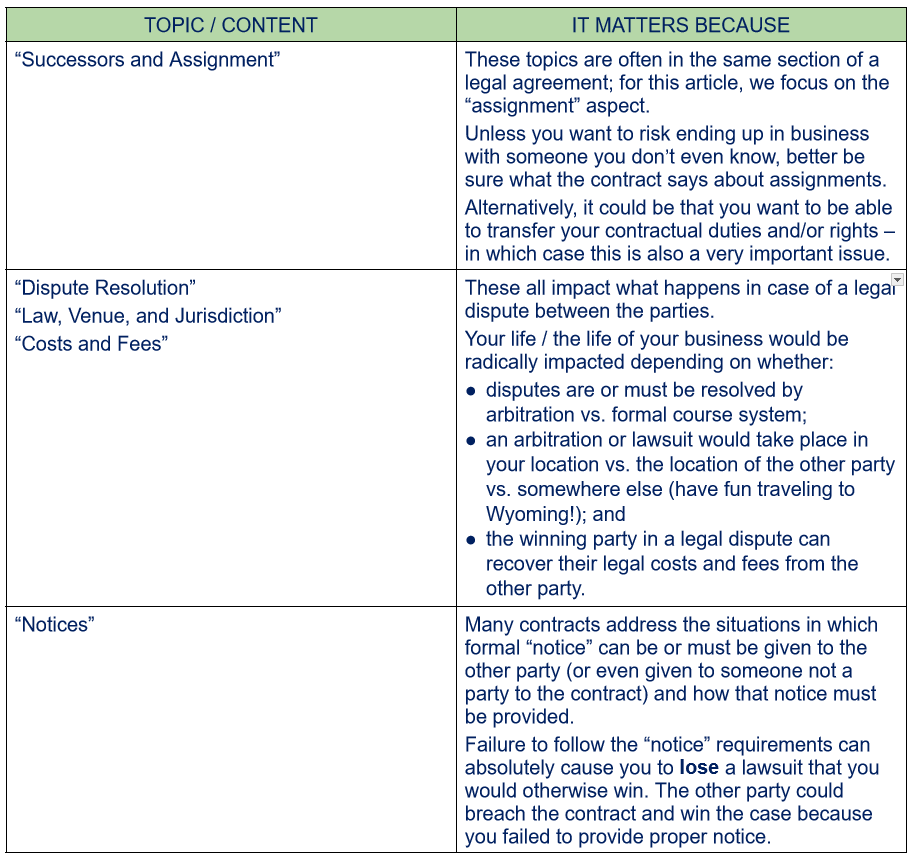

Business Contracts – Be Very Careful With Changes To Your Legal Agreements
One of the most frequent problems we business lawyers at McGrath & Spielberger encounter is when changes were made to a section of a legal agreement but the parties (or even their lawyers) failed to realize that said change should have resulted in other content being adjusted.
We sometimes call this a failure to harmonize the contractual changes, and further below are a few clear-cut, real world examples.
If you’re not an expert, or close to it, you’re not going to know enough to avoid these sorts of mistakes. We all have “swiss-cheese” knowledge (holes in our understanding), especially in fields which are not our own.
Just hire a sufficiently qualified professional to protect you by detecting and/or avoiding these sorts of mistakes in your business agreements.
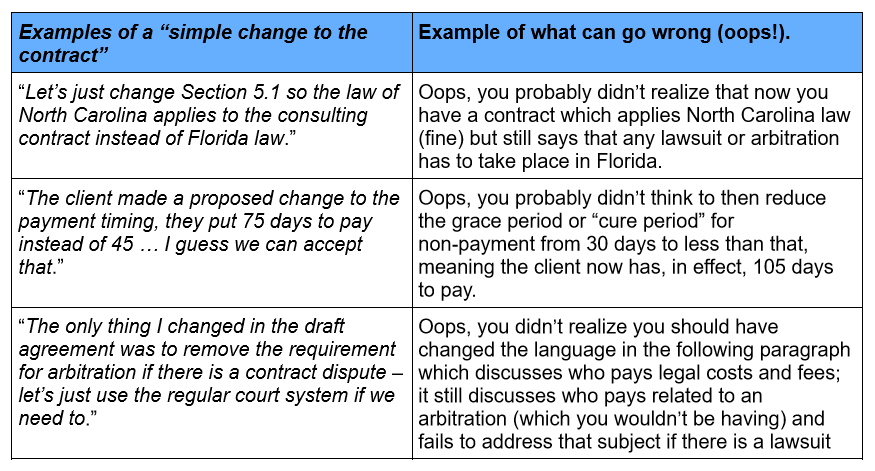 x
x
Lease or License: What’s the Difference and Why Does it Matter? – Part Three
If you have not already, check out Part One and Part Two of this series.

It’s important to distinguish between the two arrangements as it will determine the rights and remedies of the licensee or tenant. Even if the agreement is titled as a ‘license,’ if it sounds like a lease, looks like a lease, and smells like a lease, then more likely than not, it is a lease and it will be enforced as such. Careful contract drafting should be utilized by commercial property owners (or their attorneys) looking to implement an effective and enforceable license regime.
For some, a license may be the best option for their business as they can operate at a lower cost versus having to rent. A prime example of this is beauty professionals using a salon suite rather than renting a chair in a beauty salon. Many salon suites come with the furniture and/or equipment needed by the beauty professional and allows them to operate with more independence and flexibility.
For others that wish to make themselves at home in their office, the security of a lease may be more appealing to you. If you’re a potential tenant/licensee looking for clarification of an agreement presented to you or a commercial property owner looking to draft a license agreement, contact our firm for assistance.
Lease or License: What’s the Difference and Why Does it Matter? – Part Two
By now you know the difference between a lease and a license from Part One of this series but what makes one option more favorable than the other? What are some disadvantages?

In the shared office space context, a licensee is granted permission to enter onto the licensor’s property to make use of an office, desk, or other space or equipment for the licnesee’s business within the hours agreed to.
Usage by way of a license can have several benefits for licensees, such as: (1) flexibility to terminate the license; (2) all-inclusive price on a cost-per-month basis, with such prices typically less than rental prices; and (3) the occupation period of the property is normally shorter.
Of course, some drawbacks include absence of long-term security for the licensee, the inability to alter the licensed space, and at-will revocation of such license. Therefore, a license agreement allows commercial property owners to eliminate the landlord-tenant relationship and avoid having to go through the traditional eviction proceedings should any issues arise.
Regardless of what the agreement might be called (the title does not have much legal significance), there are characteristics to look for to determine whether the arrangement appears to be more like a lease rather than a license: (1) whether the use will be exclusive; (2) the arrangement relates to a particular piece of real property (is it for an entire office or just a desk?); (3) whether the use will be for a specific period of time; and (4) whether such use is in exchange for regular monthly payment (pricing for licenses may change month-to-month).
Considering the advantages/disadvantages of a license versus a lease, you may be wondering what your legal rights and remedies are under both arrangements and how they differ. We’ll be covering the legal aspects in Part Three of this series.
Lease or License: What’s the Difference and Why Does it Matter? – Part One
 With the boom in entrepreneurship in response to the COVID-19 pandemic, many entrepreneurs are attempting to navigate unfamiliar waters with regards to finding a location suited to their business needs. Since not all businesses are one-size-fits-all, many are discovering the perks of using shared office spaces through companies like WeWork and Workbar. However, many are being presented with a license agreement, rather than a lease, and aren’t sure of the difference and implications of such.
With the boom in entrepreneurship in response to the COVID-19 pandemic, many entrepreneurs are attempting to navigate unfamiliar waters with regards to finding a location suited to their business needs. Since not all businesses are one-size-fits-all, many are discovering the perks of using shared office spaces through companies like WeWork and Workbar. However, many are being presented with a license agreement, rather than a lease, and aren’t sure of the difference and implications of such.
A lease is a property interest or estate in real property that grants a tenant the right to exclusive possession of the property for their own use and enjoyment for a period of time in exchange for payment of rent. Most people are familiar with traditional leases, whether residential or commercial.
By contract, a license is a temporary right to use property for a specific purpose. A prime example of a license agreement is when you buy a ticket to a sporting event or concert – you are granted permission from the venue to occupy the seat or space for the purpose of attending the event. The permission ends when the license is revoked or the particular purpose is over or has been completed.
Whether one option is better than another depends on the particular business. The advantages and disadvantages as well as how to distinguish one from the other is further explored in Part Two of this series.
Comparison of Subchapter K v. Subchapter S

Both Subchapter K and S of the Internal Revenue Code (IRC) are pass-through tax structures in which the members of the entity are taxed for the entity’s income, gains, losses, and expenses on their individual tax returns. That is where the similarities end.
There are several differences discussed below that make Subchapter K seem more taxpayer friendly than Subchapter S. Much of the popularity of the LLC is attributable to the fact that LLCs offer limited liability to all investors combined with the more flexible partnership tax regime. In some situations, however, the goals of the business owners may be better achieved with an S corporation.
Subchapter S places very strict restrictions on the ownership and capital structure for S corporations. S corporations are limited to 100 shareholders (although members of a “family,” broadly defined, are counted as one shareholder), and they may not have more than one class of stock. Additionally, all shareholders much be individual U.S. citizens or residents and other corporations or partnerships cannot be shareholders of the company. Anyone can be a member or partner of an entity taxed under Subchapter K.
Partnerships and LLCs taxed under Subchapter K may make special allocations of income and deduction items, while shareholders of an S corporation must include corporate income and loss on a pro rata share basis. Thus, partners/members may agree to share certain income or deductions disproportionately, and the agreement will be respected for tax purposes if it reflects their economic business deal. Additionally, in most cases, partnerships and LLCs taxed under Subchapter K, can distribute appreciated property in kind without immediate recognition of taxable gain.
In a business with only a few owners, an S corporation may be the entity of choice because the flexibility of Subchapter K is not needed. S corporations are often used by owners that prefer to conduct their business as a state law corporation instead of a partnership or limited liability company because they are more comfortable with the corporate governance structure. S corporations are also often used by service providers to minimize their exposure to employment taxes. S corporations are not viable options in many situations – a business with foreign investors would not be able to make the S corporation election because foreign investors are not permissible S corporation shareholders. Additionally, many institutional investors (e.g., tax-exempt pension funds and charitable organizations) are discouraged by the tax system from investing in any type of active business that is operated as a pass-through entity. Venture capital funds, which provide a large source of capital for start-up companies, appear to be more comfortable using the familiar C corporation capitalized with several classes of stock, a structure not available in an S corporation.

For a complete analysis of the tax implications of C Corporations, Partnerships, and S Corporations click here for the Joint Committee on Taxation’s publication entitled “Choice of Business Entity: Present Law and Data Relating to C Corporations, Partnerships, and S Corporations.”
Contact us regarding your business law matter. Click here
Registered Agent for your North Carolina Business – Can you be your own Registered Agent?
This is one of a series of articles by our law firm on the topic of registered agents. For more articles on this topic, click here to access the “Registered Agent” category of articles, or select a title below.
-
Registered Agent for your North Carolina Business – What your Mandatory Registered Agent Does
-
Registered Agent for your North Carolina Business – Who Can be the Registered Agent
More articles coming soon!

First, whose Registered Agent are we referring to? We’re talking about a corporation or a limited liability company, so we mean the business entity you might own or manage, and the legal requirement in North Carolina that it have a Registered Agent (all sometimes called an “RA”).
Second, what “you” are we referring to when we ask about eligibility to be the RA? The answer to this question makes a big difference.
Can an owner, shareholder, member, or officer of a corporation or limited liability company be the RA for that business entity? Yes, as long as they reside in NC and their business address is identical to the registered agent office listed.
Can a staff member or “regular employee” of a corporation or limited liability company be the RA for that business entity? Yes, as long as they reside in NC and their business address is identical to the registered agent office listed.
Can someone not affiliated with the corporation or limited liability company in any other way be the RA for the business entity? Yes, as long as they reside in NC and their business address is identical to the registered agent office listed.
Can a corporation or business entity serve as the RA for itself? Apparently not. Interestingly, North Carolina’s statutes do not appear to directly rule this out. However, we have witnessed instances in which the NC Secretary of State has rejected attempts by business entities to do this. You can argue both sides of the question, but unless the North Carolina Secretary of State’s office changes its position (voluntarily or due to a court ruling), if you want a corp. or LLC to be your Registered Agent, it will need to be a properly qualified different corp. or LLC as your Registered Agent.
The bottom line: it’s vitally important to have a Registered Agent who is compliant and reliable.
(In case you were wondering, yes, our law firm does serve as a registered agent in both North Carolina and South Carolina, feel free to reach out to us if you’d like to know more by clicking here or calling us at 800.481.2180.)
Registered Agent for your North Carolina Business – Who Can be the Registered Agent
This is one of a series of articles by our law firm on the topic of registered agents. For more articles on this topic, click here to access the “Registered Agent” category of articles, or select a title below.
-
Registered Agent for your North Carolina Business – What your Mandatory Registered Agent Does
- Registered Agent for your North Carolina Business – Can you be your own Registered Agent?
More articles coming soon!
Who / what can be the Registered Agent for a business in North Carolina?
See further down past the table for additional information and clarifications.
Can you “be your own RA”? Stayed tuned for our next article to find out.
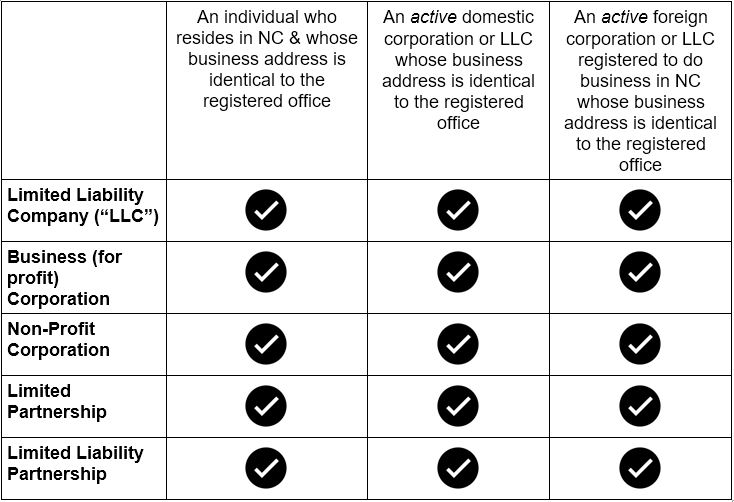
Are the laws / rules summarized above the same for “domestic” North Carolina LLCs and corporations as well as “foreign” LLCs and corporations registering or registered in NC? Yes.
The table above says that if the RA is an LLC or a corporation, it has to be an “active” one – what does that mean? This is best interpreted to mean that the LLC or corporation serving as Registered Agent itself must be (and remain) in good standing with the North Carolina Secretary of State Corporations Division. For example, the LLC or corporation serving as Registered Agent should NOT be or become administratively dissolved or under a state of suspension due to tax issues with the North Carolina Department of Revenue.
Does this mean my company can be its own Registered Agent? Great question! Click here to read about that.
Does this mean I, as an owner, officer, and/or manager can be the Registered Agent? Maybe, but even when the answer is “Yes”, that may not be the best idea. Click here for more information.
What about the reference to the “registered office”? Click here to understand the Registered Office requirements.
Are these laws / rules the same for all of North Carolina? Yes. The laws and rules on this issue are the same whether your business or Registered Agent is located in Ashville, Boone, Cary, Charlotte (or anywhere else in the “Great State of Mecklenburg”), Durham, Fayetteville, Greensboro, Raleigh, Wilmington, or any point in between in our State.
The consequences of not having a Registered Agent or not having a legally compliant RA will be explored in another article, but suffice it to say that your LLC, corporation, or other relevant business entity can suffer significant loss of legal rights and even end up with a court order, judgment, or other legal decree against it.
The bottom line: it’s vitally important to have a Registered Agent who is compliant and reliable.
(In case you were wondering, yes, our law firm does serve as a registered agent in both North Carolina and South Carolina, feel free to reach out to us if you’d like to know more by clicking here or calling us at 800.481.2180.)
Registered Agent for your North Carolina Business – What your Mandatory Registered Agent Does
 (In case you were wondering, yes, our law firm does serve as a registered agent in both North Carolina and South Carolina, feel free to reach out to us if you’d like to know more by clicking here or calling us at 800.481.2180.)
(In case you were wondering, yes, our law firm does serve as a registered agent in both North Carolina and South Carolina, feel free to reach out to us if you’d like to know more by clicking here or calling us at 800.481.2180.)
We break this short, user-friendly article down into two (2) sections: the legalities and the practicalities.
THE LEGALITIES
By way of North Carolina law, a Registered Agent (sometimes referred to as the “RA”) can be served with “service of process, notice or demand required or permitted by law to be served on an entity”. The entity being referred to here will be one of the following business entities registered with / on file to do business in N.C.:
(A) a domestic (North Carolina) business corporation, nonprofit corporation, limited liability company, limited partnership, or limited liability partnership; or
(B) a foreign corporation, nonprofit corporation, limited liability company, limited partnership, or limited liability partnership.
Thus, a Registered Agent’s primary legal duty is to receive any of the items listed above which can be served on a North Carolina LLC, corporation, or other business entity via the RA. This is true regardless of whether your business or Registered Agent is located in Asheville, Boone, Cary, Charlotte (or anywhere else in the “Great State of Mecklenburg”), Durham, Fayetteville, Greensboro, Raleigh, Wilmington, or any point in between in our State.
THE PRACTICALITIES
We lawyers at McGrath & Spielberger know that sometimes attorneys – to the detriment of their clients – don’t focus enough on the practical aspects of doing business and the day-to-day, real world ways in which the law impacts businesses and business owners. Let’s not fall into that trap – instead let’s go ahead and discuss some key practical and logistical factors relating to Registered Agents in North Carolina.
• What’s the #1 quality you need in a Registered Agent? Reliability.
• Why? Because, practically, if that Registered Agent doesn’t effectively process any of those notice-type items which it receives, you may have a problem.
• Your RA needs to get you these items to you immediately, in full, and preferably via multiple methods.
The consequences of not having a reliable RA will be explored in another article, but suffice it to say that your LLC, corporation, or other relevant business entity can suffer significant loss of legal rights and even end up with a court order, judgment, or other legal decree against it if your RA isn’t effectively and efficiently handling its duties.
The bottom line: it’s vitally important to have a Registered Agent who is compliant and reliable.
This is one of a series of articles by our law firm on the topic of registered agents. For more articles on this topic, click here to access all the “Registered Agent” category of articles or select a title below.
How Do You Expand Your Company Into North Carolina From Another State?
Option 1: keep your South Carolina LLC open and register it with the State of North Carolina as a foreign business authorized to transact in North Carolina. You’d obtain a “Certificate of Good Standing” or similar from Florida. You then provide that to the Secretary of State for North Carolina as part of your North Carolina Application for Certificate of Authority (to conduct business in North Carolina). Assuming you are approved by NC, you’re now good to go to conduct business in both states, or either state, and you can have your principal place of business in either state. You will likely be required to pay annual fees to each state and file taxes in each state, which are important factors to consider.
Option 2: start an affiliated company or subsidiary in North Carolina. In certain specific instances, you may keep your South Carolina LLC open, and instead of registering it with North Carolina, you’d prefer to create and register a separate but related business entity in North Carolina. This is typically referred to as a “subsidiary” or an “affiliated company”. You will likely be required to pay annual fees to each state and file taxes in each state, which are important factors to consider.
Additional notes. Under any of the above options, you’ll have to have a registered agent with a “continuous presence” in NC. Many law firms (like mine) agree to provide that service for a small annual fee, but your company’s “RA” doesn’t have to be a business lawyer or law firm. Of course, we also provide the very services needed to transfer your business overall.
These actions can be accomplished without an attorney, but you should at least consider consulting with an attorney any time you make a significant change to your business entity. Good luck!

Carolina Contracts: Contractual “Recitals”
Here are some of the key points contained in the video:
• Recitals often follow the introductory paragraph of a contract.
• Recitals can play a very important role later on if there is a lawsuit.
• Recitals often show the purpose of a contract.
• Be careful and make sure the Recitals contain proper information.
If you have a contract matter in North Carolina, South Carolina, Georgia, Florida or Tennessee, we invite you to fill out our confidential potential client intake form.

North Carolina Charitable Solicitation License: Does Your Non-Profit Need One?

Over the past several weeks, I’ve spoken with several different non-profit creators that were surprised to hear that their organizations would need a charitable solicitation license in connection with their fundraising efforts.
If an organization or individual asks the public for contributions and/or donations to help, aid, or otherwise support a charitable purpose, a charitable solicitation license is needed.
What is considered a “contribution?” A “contribution” means a promise, pledge, grant of any money or property, financial assistance, or any other thing of value in response to a solicitation (including in-kind contributions or goods or services).
Is my organization exempt from this license requirement? North Carolina General Statute 131F-3 provides for a number of statutory exemptions from the license requirement. A careful review of the statute should be conducted to see if your organization would qualify for such. To obtain an exemption, your organization would need to submit a written request with supporting documentation to the North Carolina Secretary of State Charities Division.
My organization isn’t exempt. What do I need to do now? If your organization does not qualify for a statutory exemption, license applications can be completed online using the Charities Division’s online filing portal.
How much is the filing fee? The license application fees are statutorily set under North Carolina General Statute 131F-8. The fees are set based on the contributions received per fiscal year.
What do I need to do every year to keep my license active? The organization will need to file a renewal application every year to keep the license active. The renewal application is due four and a half (4 ½) months after the organization’s year-end, which is the same filing deadline as the IRS Form 990.
What are the potential penalties if I fail to obtain the license? Failure to comply with the charitable solicitation license statutory requirements can result in civil and criminal penalties such as an administrative penalty up to $1,000 per act or omission which constitutes a violation, a civil penalty up to $10,000 per violation, and a criminal charge of a Class 1 misdemeanor.
What if my organization solicits contributions in other states? Many other states have some version of a charitable solicitation license and filing requirements. If your organization is soliciting funds in other states, you should speak with an attorney licensed in that state to determine if it is necessary for your organization to file in that state.
Arbitration Fees – How Much do Arbitrators Cost?
Business law Attorney Jason McGrath shares some information about how much you should expect to pay in fees to an Arbitrator in this short video.
Here are some of the key points contained in this informational video:
- Arbitrators typically charge fees similar to what lawyers charge.
- Does the Arbitrator require a minimum amount when the arbitration is scheduled? This may be called a cancellation fee or a retainer fee. The arbitrator may require this to offset a loss if the arbitration cancels.
- Arbitrators can sometimes be bargained with to lower fees but normally these are set fees.
- Arbitration fees (which are mostly made up of the Arbitrator’s fees) are often split evenly between the parties, but this can be altered by contract, law, or court order.
You should get advice from an attorney to assist in handling litigation issues like arbitration.
This is part of a continuing series of video blogs on contract law and arbitration – you can find the first part of this series on our blog or on our YouTube Channel.
If you need legal services in North Carolina, South Carolina, Georgia, Florida, Ohio, or Tennessee we invite you to fill out our confidential client form for possible legal assistance.

Arbitration: How Do You Choose The Arbitrator?
Here are some of the key points contained in the video:
- If using a panel of 3 arbitrators: each party picks an arbitrator and then those two arbitrators pick the third one.
- If using only 1 arbitrator: one side presents a list of possible arbitrators to the other side and the other side picks from the list.
- You go back and forth and negotiate between the parties until a decision is made.
- You may wish to avoid attempting private conversations with potential arbitrators in order to avoid the appearance of impropriety.
- Consider all the information available to you to make an informed decision about your arbitrator.
- Arbitrators may also be appointed by the court.
If you need legal services in North Carolina,
South Carolina,
Georgia,
Florida,
Ohio,
or Tennessee we invite you to fill out our confidential client formfor possible legal assistance.
Loan Agreements: Include Attorney Fees & Costs
Here are some of the key points contained in the video:
• DON’T EVER lend someone money without a written agreement
• DON’T EVER create a loan without including an Attorney Fees, Court Costs and Collection Costs provision.
• In most North Carolina cases, it is difficult to collect attorney fees and collection costs unless it is specifically stated in the written contract.
• What if the loan borrower does not repay the loan?
1. The lender could spend thousands of dollars in costs and fees, not to mention time invested, with no guarantee of ever collecting the money owed.
2. If obtained, a judgment will need to be enforced against the borrower, resulting in additional expenses for the lender.
3. For lawsuits by a business entity to collect on a loan, attorney representation is required, because individuals cannot represent themselves.
If you need legal services in North Carolina, South Carolina, Georgia, Florida, or Tennessee we invite you to fill out our confidential potential client form.

Arbitration Clauses and Costs + Fees
Here are some of the key points contained in the video:
1. Should attorney fee and legal costs provisions be included in an arbitration clause? Examples of options:
A. Arbitration is required, but attorneys’ fees and legal costs are specifically not allowed to be recovered by the prevailing party
B. Prevailing party can recover its attorneys’ fees and legal costs from the non-prevailing party
C. The arbitrator has discretion on these issues..
2. Consider which party is more at risk of being sued and which party has more resources.

Does the type of attorney fee being charged influence these drafting decisions?
If considering a legal agreement presented to you, you should have your attorney take a look at the contract and then make a careful decision on how to proceed based on a thorough legal analysis of your situation and the proposed contract.
If you need legal services regarding contracts, business law matters, or other matters we handle in North Carolina, South Carolina, Georgia, Florida, or Tennessee, we invite you to fill out our confidential potential client intake form.
North Carolina Premises Liability Law: What Are Your Responsibilities as a Landowner?
When someone visits your property – whether as a social guest or a repairman – there is always a chance that an injury could result. As a landowner, you may not know the extent of your potential liability when someone becomes injured on your property.

Some states, such as Florida, apply different standards of care on the part of the landowner depending on the classification of the injury person (invitee, licensee, or trespasser). Up until 1998, North Carolina courts did so as well. Now, North Carolina applies the same standard of care of landowners to all lawful visitors – landowners must exercise reasonable care in not exposing lawful visitors to dangerous conditions and must warn of any hidden dangers on the property. “Reasonable care” may mean cleaning up a spill on the floor or just maintaining the property in general.
In order to recover damages from a landowner, the visitor must prove that the landowner negligently caused the condition or failed to remedy the condition after the landowner knew or should have known of the condition’s existence. With regards to hidden dangers, a landowner is required to give an adequate warning of the danger’s existence – this could mean a natural condition (ex/ a hill) or an artificial condition (ex/ a swimming pool).
It is important to remember that the above standard of care is for lawful visitors. For unlawful visitors, a landowner’s duty is only to refrain from willfully harming the trespasser. However, there is a particular doctrine – the attractive nuisance doctrine – that allows a landowner to be held liable for injuries sustained by children who trespass on the landowner’s property if the dangerous condition was one likely to attract children.
Common types of premises liability lawsuits include:
(1) “Slip and Fall” – these cases commonly occur on commercial properties, such as a restaurant or grocery store. There are several issues that can arise in these cases – How long was the dangerous condition (i.e., the spill or liquid) present? Was a warning present (i.e., one of those yellow “Caution” signs)?
(2) Property Defects – these cases can involve injuries resulting from a broken railing or broken stairs.
(3) Dog Bites – a landowner may be liable for any injuries that his or her dog causes if the dog had shown dangerous tendencies in the past and the landowner (and dog owner) had knowledge of these tendencies at the time of the injury.
There are certain situations in which a landowner may defensibly raise the doctrine of contributory negligence, which bars recovery by the injured party if they are partially at fault. This could mean that the visitor did not properly look where they were going or failed to act reasonably at the time they became injured. Imagine a visitor going downstairs to your basement without turning the lights on and then tripping on the stairs.
Florida Residential Landlord Rights and Responsibilities: What You Need to Know Before You Buy That Investment Property
 Landlord/tenant laws cover rights and responsibilities each tenant and landlord has in their specific state. Because Florida is one of the best states in the country to invest in property, you may be considering buying an investment property. Before you do, you should understand Florida rental laws and consider certain aspects to better protect yourself and your investment, especially in the time of COVID-19.
Landlord/tenant laws cover rights and responsibilities each tenant and landlord has in their specific state. Because Florida is one of the best states in the country to invest in property, you may be considering buying an investment property. Before you do, you should understand Florida rental laws and consider certain aspects to better protect yourself and your investment, especially in the time of COVID-19.
I’m worried about damage to my property. What can I do to better protect myself and my investment?
So, you are concerned that your prospective tenant may cause damage beyond normal wear and tear. Or maybe you have concerns about your tenant’s financial situation. Luckily, there is no statutory cap on a security deposit amount in Florida and you are able to charge the deposit at your own discretion. Typically, Florida landlords charge the equivalent of a month’s rent. However, if you have concerns about your property or your tenant, you can charge more than that. While there is no limit, landlords will likely charge no more than two months’ rent. You should understand that charging an excessive security deposit may turn away prospective tenants so just be prepared for that.
What repairs am I required by law to make and what repairs can I hold the tenant responsible for?
You are legally required to keep the property “livable.” Under the doctrine of implied warranty of habitability, a landlord must maintain the structure of the building (stairs, ceiling, floors, etc. safety), provide hot/cold water, provide trash receptacles, exterminate bugs and rodents, etc. Therefore, maintenance and repair of any of those would be required.
On the other side, there are other repairs that you would not be required to fix by law, such as leaky faucets, grimy grout, and squeaky cabinet doors. Your obligations versus your tenant’s obligation to make these minor repairs should be addressed in the lease. I’ve commonly seen leases that require the tenant to pay for minor repairs and specify the price minimum for what constitutes as a ‘major’ repair. This means that, if the cost of a repair is less than the minimum amount of the major repair, you can require the tenant to make and pay for the repair.
The AC broke in my property. Do I have to repair or replace it?
Surprisingly, Florida law does not require landlords to provide or repair air conditioning. Rather, landlords are required, by statute, to provide functioning heat during the winter. However, most landlords do provide other appliances outside of just heat, such as air conditioner, ovens, refrigerators, etc. Therefore, the only instance in which you as a landlord would be responsible for repairs to additional appliances is if those repairs were included in the lease.
My tenant is claiming that I failed to repair a hazardous condition and is now threatening to withhold rent. Is this allowable?
Yes, however, the tenant must meet strict requirements. Under the previously mentioned doctrine of implied warranty of habitability, the landlord is required by law to make sure that the property is free of any hazardous or dangerous conditions. If you fail to repair the condition, the tenant has the option to either: (1) remain in the property and withhold rent until you fix the condition; or (2) move out and terminate the lease.
If the tenant seeks to remain in the property and withhold rent, the tenant:
• Must provide notice – the tenant must provide written notice to you of their intent to withhold rent at least 7 days before the rent is due. They may either hand deliver it or send the notice by certified mail. If mailed, the notice must be sent at least 12 days before the rent is due. After receiving the notice, you have 7 days to make repairs;
• Must be current in rental payments;
• Has the right to withhold all future payments – as long as the tenant follows the correct procedure, they have the right to withhold all future rental payments until the repair is completed.
The tenant told me that they’re moving out of the property but the lease doesn’t end for months. What are my options?
The tenant is “breaking” the lease, which is when a fixed-term lease is terminated before the end date without paying the remainder of the rent due. Some states require a landlord to mitigate their damages by finding a new tenant. However, Florida does not require this. A landlord has 3 options: (1) find a new tenant; (2) do nothing and collect rent from your tenant as it becomes due; or (3) invoke right to liquidated damages.
(1) Find a new tenant – So, this is something you could do but are not obligated to do. However, if you have a good relationship with your tenant, you could try to have them provide you with a replacement tenant.
(2) Collect the rent as it becomes due – This is basic contract law. Your tenant cannot just agree to do something and then change their mind without having some consequences. Unless there is an early termination clause in your lease (see below), the tenant will be required to continue to pay rent until a new tenant is found or the lease period ends.
(3) Invoke the early termination clause – Some leases include an early termination fee (aka liquidated damages clause). This fee is normally about two months’ rent and your tenant will need to give you at least 60 days’ notice that they will be terminating the lease early.
The lease with my tenant ended. How do I return the security deposit? What if there was damage to my property?
This is probably the most common issue among landlords and tenants after the lease ends. While the tenant wants their money back, you also want to get your property back in good condition. You have two options: (1) return the tenant’s security deposit in full; or (2) deduct damages from the tenant’s security deposit and return the remaining balance.
(1) Returning the Security Deposit in Full. Your property was given back in great condition and you don’t need to deduct from the deposit. Therefore, you must return the full amount within 15 days from the lease termination.
(2) Deduct Damages From the Security Deposit and Return the Remaining Balance. If there was damage to your property and you intend to deduct from the tenant’s security deposit, you have 30 days from the lease termination to notify the tenant in writing of your intent to keep part of the deposit.
• If you fail to provide this notice in writing within the 30 days, you forfeit your right to keep ANY part of the deposit.
• Additionally, statutorily, you must strictly adhere to the following or risk losing your right to withhold a portion of the deposit:
o Send the written notice by certified mail to the address you have on file. It is not your responsibility to ask the tenant for a forwarding address.
o You must state your intention to keep a portion of the deposit and the reasons why
o Inform the tenant that they have 15 days from receipt of the letter to contest the deduction in writing
o If the tenant does not object – you must deduct and return the remainder of the deposit to the tenant within 30 days of your initial letter
o If tenant does object – you can seek judicial remedies
I heard something about attorneys’ fees being a big deal in landlord/tenant matters. What’s the deal with that and do I need to be concerned as a landlord?
The landlord-tenant statute makes the award of attorneys’ fees discretionary in some instances, such as in actions to enforce rental agreement provisions and actions of possession; while in other instances, the award of attorneys’ fees are mandatory, such as actions to recover a security deposit or prohibited practices.
See the following applicable sections and notice the language contained therein (i.e., “may” versus “entitled”/”shall be”):
Section 83.48 – Attorneys fees – In any civil action brought to enforce the provisions of the rental agreement or this part, the party in whose favor a judgment or decree has been rendered may recover reasonable attorney fees and court costs from the non-prevailing party. The right to attorney fees in this section may not be waived in a lease agreement. However, attorney fees may not be awarded under this section in a claim for personal injury damages based on a breach of duty under s. 83.51.
Section 83.49 – Deposit money or advance rent; duty of landlord and tenant.
(3)(c) If either party institutes an action in a court of competent jurisdiction to adjudicate the party’s right to the security deposit, the prevailing party is entitled to receive his or her court costs plus a reasonable fee for his or her attorney. The court shall advance the cause on the calendar.
Section 83.59 – Right of action for possession
(4) The prevailing party is entitled to have judgment for costs and execution therefore.
Section 83.625 – Power to award possession and enter money judgment. The prevailing party in the action may also be awarded attorney’s fees and costs.
Section 83.67 – Prohibited practices.
(6) A landlord who violates any provision of this section shall be liable to the tenant for actual and consequential damages or 3 months’ rent, whichever is greater, and costs, including attorney’s fees.
Wedding Bell Blues: Contractual Considerations for Weddings and Events in a COVID-19 World – Part 3
As an attorney who routinely drafts and analyzes business contracts and a bride during the COVID-19 pandemic, I knew that there were several contractual aspects I would need to consider when entering into countless contracts with the vast array of people and vendors involved in planning a wedding, especially during a global pandemic.
While it appears that the initial “panic” of the COVID-19 pandemic has gradually decreased and many 2020 weddings have been rescheduled, the health concerns with regard to mass gatherings are still very much present and will not be going away any time soon. Whether you’re in the beginning stages of planning like myself, or attempting to navigate the contracts you entered into months ago, below are some considerations and legal concepts you may find helpful.
Refund of Deposits
Most service contracts have a deposit or fee due at booking in order to hold the date for your event. Typically, these deposits are non-refundable. Well, what if the contract wasn’t performed due to force majeure or impracticability/frustration of purpose, can I get my deposit back? It will depend on the circumstances, but maybe not. Global pandemic or not, these initial deposits are usually just to hold that date – thereby, causing the servicer (caterer, photographer, wedding planner, etc.) to turn away other events for the same date, i.e., business for them – so that part of the contract has already been ‘performed.’
Wedding Bell Blues: Contractual Considerations for Weddings and Events in a COVID-19 World – Part 2
As an attorney who routinely drafts and analyzes business contracts and a bride during the COVID-19 pandemic, I knew that there were several contractual aspects I would need to consider when entering into countless contracts with the vast array of people and vendors involved in planning a wedding, especially during a global pandemic.
While it appears that the initial “panic” of the COVID-19 pandemic has gradually decreased and many 2020 weddings have been rescheduled, the health concerns with regard to mass gatherings are still very much present and will not be going away any time soon. Whether you’re in the beginning stages of planning like myself, or attempting to navigate the contracts you entered into months ago, below are some considerations and legal concepts you may find helpful.
Impracticability + Frustration of Purpose
Regardless of whether your contract includes a force majeure clause or not, general contract principles will still apply. The doctrine of impracticability refers to an unforeseeable event or incident that could not have been anticipated which makes performance under the contract unreasonable and difficult. North Carolina courts apply this doctrine in cases where a party’s performance is rendered practically impossible by law and thus the party is unable to fulfill its obligations under the contract. This defense could apply in a situation in which an event or wedding was to originally be held during a government closure order due to COVID-19.
The frustration of purpose doctrine refers to when the unforeseeable event or incident undercuts the prime purpose of the contract and may be applied even if a party’s performance isn’t necessarily impossible. An example in the event context would be your catering contract during a government order limiting mass gatherings – obviously, the order frustrates the purpose of your catering contract and thus the defense may excuse your performance.
It’s important to note that these defenses will usually not apply where the event is reasonably foreseeable.
Wedding Bell Blues: Contractual Considerations for Weddings and Events in a COVID-19 World – Part 1
As an attorney who routinely drafts and analyzes business contracts and a bride during the COVID-19 pandemic, I knew that there were several contractual aspects I would need to consider when entering into countless contracts with the vast array of people and vendors involved in planning a wedding, especially during a global pandemic.

While it appears that the initial “panic” of the COVID-19 pandemic has gradually decreased and many 2020 weddings have been rescheduled, the health concerns with regard to mass gatherings are still very much present and will not be going away any time soon. Whether you’re in the beginning stages of planning like myself, or attempting to navigate the contracts you entered into months ago, below are some considerations and legal concepts you may find helpful.
Force Majeure
Service contracts typically have stated procedures or policy for when an event is cancelled or interfered with. The cancellation policy may reference “Acts of God,” which is commonly referred to as a “force majeure” clause. These clauses, if invoked, may relieve one or both parties from being penalized for breaching the contract based upon nonperformance due to a disruption caused by an unpredictable event.
While courts can enforce these clauses, they will treat each clause different as no two clauses are the same. Each clause differs in what triggers the clause (i.e., the event, incident, and/or catastrophe) and the parties’ available options if the clause is triggered (i.e., right to cancel the contract, ability to reschedule event, etc.). Common triggering events included in these clauses are Acts of God, government action or regulation, natural disasters, and terrorism. Okay, so a global pandemic would be considered an “Act of God,” right? Maybe. Maybe not.

So what can you do? If you are currently engaged in the negotiation stage of your contract, you can insist on the clause including language specific to COVID-19, such as “pandemic” or “public health crisis” in the chance that there is another ‘wave’ of infection. Regarding your options after the clause is triggered, you and the other party should discuss what can be done should you need to cancel your original wedding or event date. Rather than provide the option for either party to cancel the contract altogether, it would be advantageous to, instead, suggest that the clause provide for the rescheduling of the event within a specified period of the original event date, like six months or a year.
In the absence of a force majeure clause or the language that specifically suggests COVID-19 concerns, you may have still have some defenses to your contract obligations under the doctrines of impracticability and frustration of purpose.
💬 We hope you enjoyed the post. Return to our blog next Wednesday for part two.
Commercial Leases in South Carolina Amid the Covid-19 Coronavirus Pandemic
At McGrath and Spielberger, PLLC, we represent many local and regional clients who own and operate many different types of businesses, including restaurants, gyms, retail stores, and other commercial businesses, throughout North Carolina, South Carolina, Florida, Georgia, Ohio and Tennessee. We are obviously hearing a lot from our clients right now regarding their issues and concerns in relation to the Covid-19 coronavirus pandemic. Overwhelmingly, most client inquiries relate to commercial leases in which our clients are tenants. Their main questions typically revolve around their requirement to pay rent and whether they can be held in default and/or evicted during the pandemic.
This article will focus on the answers to these question in relation to commercial leases in South Carolina specifically, but a lot of what is discussed may also apply in other states. As of now, without an explicit agreement with the landlord under the lease regarding payment of rent during this pandemic, there are “simple” answers and “practical” answers that either now exist or that will eventually reveal themselves. Please also note that the answers to the above questions are fluid and may be affected by forthcoming government relief programs and bailouts.
Do I have to pay rent?
Simple Answer: Yes.

Practical Answer: Still yes unless some sort of law is passed allowing commercial tenants to stop paying rent for a period of time, unless your landlord has specifically told you your rent will be abated, or unless your lease agreement has an applicable Force Majeure clause or other clause which would relieve your obligation to pay rent (Click here for a brief summary of what a Force Majeure clause is). As of now, there have been no Federal or state orders issued or laws passed that currently allow tenants to stop paying rent or requiring landlords to provide any type of rent relief.
Can I be held in default and/or evicted during the Covid-19 coronavirus pandemic?
Simple Answers: Held in default, yes. Evicted, probably not for the immediate future.
Practical Answer: Again, still yes for default. As far eviction goes, though, when you can or will actually be evicted or ruled by a court to be in default is somewhat up in the air and it likely won’t be before May 1, 2020. On March 18, 2020, the South Carolina Supreme Court issued an order stating, in part, “. . . that all evictions currently ordered and scheduled statewide shall be rescheduled for a date not earlier than May 1, 2020.” While this order does not specifically differentiate between commercial and residential leases, the lack of such differentiation bolsters an argument that the order applies to all leases, both commercial and residential. And despite some public perceptions to the contrary, the order does not state in any way whatsoever that tenants in commercial leases are excused from paying rent, that landlords cannot add late fees, penalties and interest to late or unpaid rent payments, or that landlords can’t hold tenants in default or file to evict them for not paying rent or otherwise violating their leases. It simply means that virtually no eviction hearings will be heard in court prior to May 1, 2020. It should also be noted that South Carolina law does not necessarily require a landlord to file an eviction action to remove a tenant – in some cases “self-help” evictions are allowed. However, they are rarely utilized because they pose many risks to and are wrought with pitfalls for landlords trying to utilize them. So, practically, if you fail to pay your rent or otherwise violate the terms of your lease, you are unlikely to be physically evicted or ejected from your leased space prior to May 1, 2020, and probably much later due to the backup of cases that will result from the order. But you can still be in default of your lease and may be liable for past due rent, penalties, late fees, interest and other damages suffered by your landlord due to your failure to pay rent or comply with other provisions of your lease.
So, if you cannot pay your rent due to the Covid-19 coronavirus pandemic, or for any other reason, we highly recommend you first discuss it with an attorney. It may be that approaching your landlord and reaching an agreement that works for both of you is the best approach, or it may be that your specific situation requires more complex and/or drastic steps. If you are located in one of the jurisdictions in which McGrath and Spielberger has licensed attorneys, please contact us and we would be happy to assist you analyze your situation and form a plan that will allow your business to survive during these unprecedented times. You can click here, email us at info@mcgrathspielberger.com, or call us at 800.481.2180.
McGrath and Spielberger, PLLC handles business law, contract law and commercial lease matters every day, and has lawyers who are licensed to practice in FL, GA, NC, OH, SC, and TN (if you are unsure as to what jurisdiction applies to your legal matter, we can help make that determination).
Coronavirus, Force Majeure, and Your Business Contract – Will the Charlotte Hornets and Other NBA Players Be Paid?
What contract controls the relationship between the National Basketball Association and its teams like the Boston Celtics on the one side and players like Kemba Walker on the other? The relationship between the NBA, the teams, and the players is generally governed by contract law, and specifically a business contract almost 600 pages long titled the “Collective Bargaining Agreement” (the “CBA”).
What key part of the CBA might largely control what happens in these coronavirus-induced circumstances? What immediately comes to mind is whether there is a “Force Majeure” clause somewhere in those many pages of fine legal verbiage. Click here for a brief recap of what a Force Majeure clause is; in essence, some unusual, significant condition beyond the control of a contractual party which interferes with that party’s ability to perform duties under the contract. Yep, on page 467 is “Section 5: Termination by NBA/Force Majeure”.
Is something like COVID-19 addressed in the CBA under the Force Majeure clause? Notably, the list of Force Majeure items in the NBA’s contract with the National Basketball Players Association [sic] does include “epidemics”. That term is not defined specifically in the CBA, which means we’d typically look to the standard definition, perhaps influenced by what definitions relevant courts of law have accepted over time. “Epidemic: a disease affecting many persons at the same time, and spreading from person to person in a locality where the disease is not permanently prevalent.” Very few reasonable minds would disagree that coronavirus is an epidemic in the United States right now (and in Canada to a certain extent, let’s not forget the reigning NBA champion Toronto Raptors).
You should also know that the Collective Bargaining Agreement – which, again, is a business contract – allows the NBA to terminate that contract after a Force Majeure event.
So does coronavirus mean that the NBA doesn’t have to pay the players while games are suspended? There may be an epic battle over that very question. The CBA specifically states that if a Force Majeure event (like coronavirus – an “epidemic”) occurs and causes teams not to be able to play one or more games, and those games are not made up, each player who was part of that team shall have his overall compensation for that season reduced by 1.08%. (In the contract it’s actually expressed as a fraction – 1/92.6th, based on an agreement that for this purpose a season is made up of 92.6 games.)
Interestingly, this part of the CBA specifically states that neither the NBA nor the Players Association must terminate the contract even if it has the right to do so, including as to the NBA’s right to cancel the CBA due to this Force Majeure event. However, there is not similar language which specifically addresses whether the NBA has the option to reduce compensation to the players under a Force Majeure circumstance. Thus we are left with language mentioned in the previous paragraph (and in the CBA itself, the previous page) which says that the players’ compensation “shall” be reduced.
If I was arguing for non-payment, I’d argue that the contract doesn’t allow the teams to pay the players in these circumstances even if the teams wanted to. The players, presumably, would argue that a contractual party always has the right not to enforce one of its rights, and thus the teams could of course pay the players if they so choose. Also, there are certainly other aspects of this 598-page contract, governed by New York and/or Federal law, which influence these legalities, and this article is not attempting to engage in a detailed analysis of this issue and is not attempting to interpret or comment on New York law.
This NBA stuff is interesting, but what about my business? Can your lawyers help my company deal with contract issues? Yes, that’s what we do. We explore, we troubleshoot, we diagnose, we advise, we repair, we resolve, we combat, whichever is appropriate. If you want help and the subject matter and the jurisdiction (which state, etc.) match up with those of our Firm, reach out to us and ask for a consultation; one way to do so is by clicking here. Good luck and keep yourself – and your business – safe!
McGrath and Spielberger, PLLC handles business law and contract law matters every day, and has lawyers who are licensed to practice in FL, GA, NC, OH, SC, and TN (if you are unsure as to what jurisdiction applies to your legal matter, we can help make that determination).
Coronavirus, Force Majeure, and Your Business Contract Explained
Coronavirus (more formally known as COVID-19) is now impacting every part of life. Let’s start figuring out if and how it impacts your business law contract, initially by asking and answering these fundamental questions that are being posed.
- Practically, how might the coronavirus impact my business agreement?
- How could something like the coronavirus be covered in my business law contract?
- Are we talking about “Acts of God?”
- How do I know if the “Force Majeure” principle applies to my business agreements?
- What do I do if my business’ rights or duties are significantly impacted by COVID-19?
- Can your lawyers help my company deal with this now and make improvements for the future?
 Practically, how might the coronavirus impact my business agreement? You’re probably paying for a product or service, or being paid for a product or service – or both being paid and paying. Supply chains are interrupted, resources are interfered with, money is short. This pandemic is devastating across the entire spectrum of the commercial world in addition to our personal worlds. You may suddenly not be able to fulfill your normal contractual duties to supply, not be able to pay, or not be getting paid.
Practically, how might the coronavirus impact my business agreement? You’re probably paying for a product or service, or being paid for a product or service – or both being paid and paying. Supply chains are interrupted, resources are interfered with, money is short. This pandemic is devastating across the entire spectrum of the commercial world in addition to our personal worlds. You may suddenly not be able to fulfill your normal contractual duties to supply, not be able to pay, or not be getting paid.
How could something like the coronavirus be covered in my business law contract? Probably by way of what is usually called a “Force Majeure” clause. This type of provision, found in most well-drafted business law agreements, typically excuses a contractual party from performing its duties, in part or in whole, for a temporary time without being in breach of the contract, if the non-performance is due to the Force Majeure cause / event.
Are we talking about “Acts of God?” Yes, no, and/or maybe. (Great lawyer answer, right? In all seriousness, in some ways the answer to this question somewhat depends on one’s religious beliefs.) “Back in the day” Force Majeure contractual clauses were often referred to as “Acts of God” clauses. Now, many contracts which have Force Majeure clauses include in the list of possible events/causes the words “acts of God”. For example, you might be excused from performing your duties to the extent that you cannot reasonably perform them due to “hurricanes, labor strikes, power outages, acts of God…,” etc. But Force Majeure clauses, as you can see, typically include many more events/causes than “acts of God” alone.
How do I know if the “Force Majeure” principle applies – or could apply – to my business agreements? Could the Force Majeure principle apply to your contracts? If the contract has such a clause, then yes. The answer can somewhat be ‘yes’ even if you don’t have such a clause, but that’s a sub-topic for a different article. Does this principle apply to your business contract? If it has a Force Majeure clause and if there are Force Majeure type causes/events interfering with the performance of the contract, then yes it likely applies. (Please understand we aren’t saying that the clause applies in your exact situation, which is not known to us, and please understand we aren’t giving legal analysis about any specific situation – each specific situation depends on an analysis of the specific facts involved.)

What do I do if my business’ rights or duties are significantly impacted by COVID-19? For one thing, find out if there is a Force Majeure contract clause which may apply. If there is, ask a lawyer to analyze your situation. Even if there isn’t, ask a lawyer to analyze your situation. Practically, it also makes sense to consider communicating with your contractual partners to alert them to the challenging circumstances, whether those circumstances may cause you to be unable to perform or you fear that they may cause another party to fail to perform, or both, and see what cooperative measures can be agreed upon, or at least level-set expectations and confirm present-day realities.
Can your lawyers help my company deal with this now and make improvements for the future? That’s what we do. We explore, we troubleshoot, we diagnose, we advise, we repair, we resolve, we combat – whatever the situation calls for. If you want help and the subject matter and the jurisdiction (which state, etc.) match up with those of our Firm, reach out to us and ask for a consultation; one way to do so is by clicking here. Good luck and keep yourself – and your business – safe!
McGrath and Spielberger, PLLC handles business law and contract law matters every day, and has lawyers who are licensed to practice in FL, GA, NC, OH, SC, and TN (if you are unsure as to what jurisdiction applies to your legal matter, we can help make that determination).
Mecklenburg County “Stay at Home” Order: the County’s News release, FAQ, and Order Itself
⦿ Mecklenburg County’s News Release for Order
⦿ Frequently Asked Questions
⦿ County’s “Stay at Home” Orders – Full Text
⦿ Take our Survey
County Issues ‘Stay at Home’ Order for Next 21 Days – released 3/24/2020
As the number of COVID-19 cases continue to rise in Mecklenburg County, the Charlotte- Mecklenburg Emergency Management Office has announced a Stay-at-Home order for County residents. The order will go into effect on Thursday, March 26 at 8:00 a.m. and will remain in effect until April 16, 2020.
The order was announced Tuesday afternoon by Mecklenburg County Manager Dena Diorio during the Board of County Commissioners Budget and Public Policy meeting.
The order will require County residents to remain in their homes for the next 21 days in an attempt to reduce the number of new COVID-19 infections within the County. Exceptions will be allowed for those seeking medical treatment, buying food or exercising outdoors.
Essential workers, including hospital and medical staff, pharmacy employees, law enforcement, firefighters, EMS Agency (MEDIC), some government employees and food service and grocery store employees will be allowed to travel to work. There are also many other essential business operations that can continue to operate.
“As we said from the beginning, we must act based on what we are seeing on the ground in our community,” said Harris. “Mecklenburg County has far more cases than any other County in North Carolina, and this extra step will keep more people away from each other and begin to flatten the rate of new cases before the hospital system becomes overwhelmed.”
The order will be enforced by Charlotte-Mecklenburg Police Department and the police departments of the six towns in Mecklenburg County.
The order will not prohibit restaurants from providing take out or delivery options. It also does not prohibit daycares, homeless shelters and government agencies from operating.
For more information on the Stay-at-Home order including frequently asked questions, and a complete list of essential services, visit MeckNC.gov/covid-19.
Mecklenburg County COVID-19 Stay at Home Order– Frequently Asked Questions
What does this order mean?
It restricts travel upon public streets, alleys, or roadways or other property except by those in need of medical assistance, food or other commodity or service necessary to sustain the well-being of themselves or their families or some member thereof.
What is the purpose/goal of this order?
How does this order change the previous executive order prohibiting mass gatherings of 50 people or more?
What is and not allowed?
• Go to the grocery, convenience or warehouse store
• Go to the pharmacy to pick up medications and other healthcare necessities
• Visiting a health care professional for medical services that cannot be provided virtually (call first)
• Go to a restaurant for take-out, delivery or drive-thru
• Care for or support a friend or family member
• Take a walk, ride your bike, hike, jog and be in nature for exercise – just keep at least six feet between you and others
• Walk your pets and take them to veterinarian if necessary
• Help someone to get necessary supplies
• Receive deliveries from any business which delivers
• Go to work unless you are providing essential services as defined by this Order
• Visit friends and family if there is no urgent need
• Maintain less than 6 feet of distance from others when you go out
• Visit loved ones in the hospital, nursing home, skilled nursing facility or other residential care facility, except for limited exceptions as provided on the facility websites
• Travel except for essential travel and activities
What is the difference between “Stay at Home” and “social distancing”? Stay at home is a stricter form of social distancing. Stay at home means:
• Only go out for essential services
• Stay 6 feet or more away from others
• Don’t gather in groups
When will this order be lifted?
Activities and businesses/travel that are considered essential.
Activities that are considered essential.
Businesses and types of work are considered essential.
• Laundry services
I live outside of Mecklenburg County. How does this affect me?
What are minimum basic operations?
What is considered essential travel?
Am I allowed to travel?
Am I allowed to go outside to exercise?
What are the requirements for social distancing?
Enforcement Activities
Can I get arrested for violating this order?
How do I report a violation of this order?
I live in (Huntersville/Cornelius/Davidson/Pineville/Matthews/Mint Hill) – does this order apply to me?
Does this order apply to the homeless?
Non-essential business and travel
What does this mean for non-essential businesses?
The order says I am allowed to go outside – can I take my children to parks/amusement centers?
All places of public amusement where people may gather, whether indoors or outdoors, including but not limited to, locations with amusement rides, carnivals, amusement parks, water parks, aquariums, zoos, museums, arcades, fairs, children’s play centers, playgrounds, recreation centers, funplexes, theme parks, bowling alleys, movie and other theaters, concert and music halls, and country clubs or social clubs shall be closed to the public.
Can I visit a loved one in a hospital/nursing home/etc.?
Mecklenburg County “Stay at Home” Orders Text
WHEREAS, G.S. §166A-19.22, which is part of the North Carolina Emergency Management Act, authorizes counties to declare a state of emergency under conditions and following procedures contained in G.S. §166A-19.22; and
WHEREAS, the Governor has declared a state of emergency on behalf of the state of North Carolina on March 10, 2020; and
WHEREAS, Mecklenburg County in conjunction with the City of Charlotte and six towns within the County signed a Joint Declaration of Emergency on 13 March 2020; and
WHEREAS, among other things the Declaration restricted access and travel upon public streets, alley, or roadway or upon any other public property within the area(s) or times as designated by the Mecklenburg County Public Health Department in conjunction with CityCounty Emergency Management except by those in search of medical assistance, food or other commodity or service necessary to sustain the well-being of themselves or their families or some member thereof; and
WHEREAS, the Declaration further restricted movement of people in public places and the operation of business activity, entertainment, events or other places of mass gatherings as reasonably necessary to overcome or prevent further aggravation of the emergency, and any other activities or conditions whereby the control of which maybe be reasonably necessary to maintain order and protect lives or property during the state of emergency, except in areas or times designated by the Mecklenburg County Health Department in conjunction with Emergency Management, and
WHEREAS, since execution of the Declaration, residents of the county have been tested for the COVID-19 virus. Initially, there was a connection and correlation between positive results and out of county travel or contact with someone known or believed to have been positive; however as of March 23, 2020 there 108 cases COVID-19 in the County, as well as increasing evidence of cases in neighboring counties, including a significant and increasing number of suspected cases of community transmission and likely further significant increases in transmission. Widespread testing of COVID-19 is not yet available but is expected to increase in the coming days. This Joint Declaration and Order is necessary to slow the rate of spread; and
WHEREAS, scientific evidence and best practices regarding the most effective approaches to slow the transmission of communicable diseases generally and COVID-19 particularly, and evidence that age, condition and health of a significant portion of the population of the County, the City of Charlotte and surrounding Towns places the population at risk of serious health complications, including death from COVID-10; and
WHEREAS, many individuals who contract the virus display no symptoms or have mild symptoms which means they may not be aware they carry the virus. People without symptoms can transmit the disease and because evidence shows the disease is easily spread, mass gatherings can result in further transmissions of the virus; and
WHEREAS, it is essential to slow viral transmission as much as possible to protect the most vulnerable and to prevent the health care system from being overwhelmed; and
WHEREAS, this Revised Joint Order and Declaration is necessary to slow the rate of the spread and is the least restrictive based upon the current evidence.
Prohibited activities. All public and private gatherings of more than 10 people are prohibited, except for the limited purposes permitted by this Proclamation . Nothing herein prohibits the gathering of members of a household or residence.
All places of public amusement where people may gather, whether indoors or outdoors, including but not limited to, locations with amusement rides, carnivals, amusement parks, water parks, aquariums, zoos, museums, arcades, fairs, children’s play centers, playgrounds, recreation centers, funplexes, theme parks, bowling alleys, movie and other theaters, concert and music halls, and country clubs or social clubs shall be closed to the public.
This Proclamation supersedes the restrictions outlined in the Public Health Order to Restrict Mass Gatherings, which prohibited gatherings of 50 people or more.
Restrictions on nursing homes, long term care facilities and assisted living facilities operated pursuant to Article 6 of NC General Statute Chapter 131E:
a. Owners, administrators, operators, staff, contractors, and volunteers of nursing homes, long term care and assisted living facilities are prohibited from allowing residents, customers, clients, or visitors from assembly in spaces that do not permit appropriate social distancing which consists of separation of 6 feet or more between each individual.
b. Owners, administrators, operators, staff, contractors, and volunteers of nursing homes, long term care and assisted living facilities are prohibited from allowing a person to enter the facility and visit a resident unless each of the following criteria are met: (1) the visitor is an adult, (2) the resident has not already had a visitor that day; and (3) the visit takes place in the resident’s room. This prohibition does not apply to end of life situations.
c. No person is allowed to visit a resident of a nursing home, long term care or assisted living facility unless the visitor has been screened prior to entry for signs and symptoms of COVID-19 including the following: fever of 100.4 or higher, cough, or difficulty breathing, contact in past 14 days with a person who has a confirmed diagnosis of COVID-19 or who is under investigation for COVID-19. All visitors may be required to take precautionary measures including, but not limited to, social distancing or wearing personal protective equipment.
d. No person is allowed to visit a resident of a nursing home, long term care or an assisted living facility unless the visitor shows identification, signs into a visitor’s log that includes the date and time in and time out , and provide their name and contact information including phone number and email if available.
e. Operators and staff of nursing homes, long term care and assisted living facilities are prohibited from destroying each day’s visitor log for a period of 30 days from that day.
f. Owners, administrators and operators shall ensure adequate staffing to manage all occupants of the facility to include lifting and moving uninjured occupants.
Prohibited and permitted travel. All travel, including, but not limited to, travel by automobile, motorcycle, scooter, , train, plane, or public transit, except Essential Travel and Essential Activities as defined herein or otherwise defined in this Proclamation, is prohibited. People riding on public transit must comply with Social Distancing Requirements to the greatest extent feasible. This Proclamation allows travel into or out of the County to maintain Essential Businesses and Operations and Minimum Basic Operations.
1. Leaving the home for essential activities is permitted. For purposes of this Proclamation, individuals may leave their residence only to perform any of the following Essential Activities:
- For health and safety. To engage in activities or perform tasks essential to their health and safety, or to the health and safety of their family or household members (including, but not limited to, pets), such as, by way of example only and without limitation, seeking emergency services, obtaining medical supplies or medication, or visiting a health care professional for medical services that cannot be provided virtually.
- For necessary supplies and services. To obtain necessary services or supplies for themselves and their family or household members, or to deliver those services or supplies to others, such as, by way of example only and without limitation, groceries and food, household consumer products, supplies they need to work from home, and products necessary to maintain the safety, sanitation, and essential operation of residences.
- For outdoor activity. To engage in outdoor activity, provided the individuals comply with Social Distancing Requirements, as defined herein, such as, by way of example and without limitation, walking, hiking, golfing, running, cycling, or using the greenways. Individuals may go to public parks and open outdoor recreation areas. However, playgrounds may increase spread of COVID-19, and therefore shall be closed.
- For certain types of work. To perform work providing essential products and services at Essential Businesses or Operations (which, as defined below, includes Healthcare and Public Health Operations, Human Services Operations, Essential Governmental Functions, and Essential Infrastructure) or to otherwise carry out activities specifically permitted in this Executive Order, including Minimum Basic Operations.
- To take care of others. To care for a family member, friend, or pet in another household, and to transport family members, friends, or pets as allowed by this Executive Order.
3. Healthcare and Public Health Operations. For purposes of this Proclamation , individuals may leave their residence to work for or obtain services through Healthcare and Public Health Operations.
Healthcare and Public Health Operations includes, but is not limited to: hospitals; clinics when medical/dental care cannot be provided virtually; pharmacies; public health entities, including those that compile, model, analyze and communicate public health information; pharmaceutical, pharmacy, medical device and equipment, and biotechnology companies (including operations, research and development, manufacture, and supply chain); organizations collecting blood, platelets, plasma, and other necessary materials; reproductive health care providers; home healthcare services providers; mental health and substance use providers; other healthcare facilities and suppliers and providers of any related and/or ancillary healthcare services; and entities that transport and dispose of medical materials and remains.
Specifically included in Healthcare and Public Health Operations are manufacturers, technicians, logistics, and warehouse operators and distributors of medical equipment, personal protective equipment (PPE), medical gases, pharmaceuticals, blood and blood products, vaccines, testing materials, laboratory supplies, cleaning, sanitizing, disinfecting or sterilization supplies, and tissue and paper towel products.
Healthcare and Public Health Operations also includes veterinary care and all urgent healthcare services provided to animals.
Healthcare and Public Health Operations shall be construed broadly to avoid any impacts to the delivery of healthcare, broadly defined. Healthcare and Public Health Operations does not include fitness and exercise gyms, spas, salons, barber shops, tattoo parlors, and similar facilities.
4. Human Services Operations. For purposes of this Proclamation, individuals may leave their residence to work for or obtain services that are not available via online or mail-in applications, and telephone interviews at any Human Services Operations, or Medicaid providers that is providing services to the public and including state-operated, institutional, or community-based settings providing human services to the public.
Human Services Operations include, but is not limited to: long-term care facilities; residential settings and shelters for adults, seniors, children, and/or people with developmental disabilities, intellectual disabilities, substance use disorders, and/or mental illness; transitional facilities; home-based settings to provide services to individuals with physical, intellectual, and/or developmental disabilities, seniors, adults, and children; field offices that provide and help to determine eligibility for basic needs including food, cash assistance, medical coverage, child care, vocational services, rehabilitation services; developmental centers; adoption agencies; businesses that provide food, shelter, and social services, and other necessities of life for economically disadvantaged individuals, individuals with physical, intellectual, and/or developmental disabilities, or otherwise needy individuals.
Human Services Operations shall be construed broadly to avoid any impacts to the delivery of human services, broadly defined.
5. Essential Infrastructure. For purposes of this Proclamation, individuals may leave their residence to provide any services or perform any work necessary to offer, provision, operate, maintain and repair Essential Infrastructure.
Essential Infrastructure includes, but is not limited to: food production, distribution, and sale; construction (including, but not limited to, construction required in response to this public health emergency, hospital construction, construction of long-term care facilities, public works construction, and housing construction); building management and maintenance; airport operations; operation and maintenance of utilities, including water, sewer, and gas; electrical (including power generation, distribution, and production of raw materials); distribution centers; security system operation and maintenance; oil and biofuel refining; roads, highways, railroads, and public transportation; ports; cybersecurity operations; flood control; solid waste and recycling collection and removal; and internet, video, and telecommunications systems (including the provision of essential global, national, and local infrastructure for computing services, business infrastructure, communications, and web-based services).
Essential Infrastructure shall be construed broadly to avoid any impacts to essential infrastructure, broadly defined.
6. Essential Governmental Functions. For purposes of this Proclamation, all first responders, emergency management personnel, emergency dispatchers, court personnel, law enforcement and corrections personnel, hazardous materials responders, child protection and child welfare personnel, adult protection services, housing and shelter personnel, military, and other governmental employees working for or to support Essential Businesses and Operations are categorically exempt.
Essential Government Functions means all services provided by the County or any municipality, township, subdivision or agency of government and needed to ensure the continuing operation of the government agencies or to provide for or support the health, safety and welfare of the public, and including contractors performing Essential Government Functions. Each County, City or Town Manager shall determine its Essential Governmental Functions and identify employees and/or contractors necessary to the performance of those functions.
This Proclamation does not apply to the NC State or federal government. Nothing herein shall prohibit any individual from performing or accessing Essential Governmental Functions.
7. Businesses covered by this Proclamation. For the purposes of this Proclamation, covered businesses include any for-profit, non-profit, or educational entities, regardless of the nature of the service, the function it performs, or its corporate or entity structure.
Essential Businesses and Operations. For purposes of this Proclamation, Essential Businesses and Operations means Healthcare and Public Health Operations, Human Services Operations, Essential Governmental Functions, and Essential Infrastructure, and the following:
1. Stores that sell groceries and medicine. Grocery stores, pharmacies, certified farmers’ markets, farm and produce stands, supermarkets, convenience stores, and other establishments engaged in the retail sale of groceries, canned food, dry goods, frozen foods, fresh fruits and vegetables, pet supplies, fresh meats, fish, and poultry, alcohol and nonalcohol beverages and any other household consumer products (such as cleaning and personal care products). This includes stores that sell groceries, medicine, including medication not requiring a medical prescription, and also that sell other nongrocery products, and products necessary to maintaining the safety, sanitation, and essential operation of residences and Essential Businesses and Operations;
2. Food, beverage, and agriculture. Food and beverage manufacturing, production, processing, and cultivation, including farming, livestock, fishing, baking, and other production agriculture, including cultivation, marketing, production, and distribution of animals and goods for consumption; and businesses that provide food, shelter, and other necessities of life for animals, including animal shelters, rescues, shelters, kennels, and adoption facilities;
3. Organizations that provide charitable and social services. Businesses and religious and secular nonprofit organizations, including food banks, when providing food, shelter, and social services, and other necessities of life for economically disadvantaged or otherwise needy individuals, individuals who need assistance as a result of this emergency, and people with disabilities; 4. Media. Newspapers, television, radio, and other media services;
5. Gas stations and businesses needed for transportation. Gas stations and auto- supply, auto-repair, and related facilities and bicycle shops and related facilities;
6. Financial institutions. Banks, currency exchanges, consumer lenders, including but not limited, to payday lenders, pawnbrokers, consumer installment lenders and sales finance lenders, credit unions, appraisers, title companies, financial markets, trading and futures exchanges, affiliates of financial institutions, entities that issue bonds, related financial institutions, and institutions selling financial products;
7. Hardware and supply stores. Hardware stores and businesses that sell electrical, plumbing, and heating material;
8. Critical trades. Building and Construction Tradesmen and Tradeswomen, and other trades including but not limited to plumbers, electricians, exterminators, cleaning and janitorial staff for commercial and governmental properties, security staff, operating engineers, HVAC, painting, moving and relocation services, and other service providers who provide services that are necessary to maintaining the safety, sanitation, and essential operation of residences, Essential Activities, and Essential Businesses and Operations;
9. Mail, post, shipping, logistics, delivery, and pick-up services. Post offices and other businesses that provide shipping and delivery services, and businesses that ship or deliver groceries, food, goods or services to end users or through commercial channels;
10. Educational institutions. Educational institutions—including public and private pre-K12 schools, colleges, and universities—for purposes of facilitating distance learning, performing critical research related to COVID-19, or performing essential functions, provided that social distancing of six-feet per person is maintained to the greatest extent possible. This Proclamation is consistent with and does not amend or supersede Executive Order, except that affected schools are ordered closed through May 15, 2020 ; Charlotte-Mecklenburg School System remains under the command and control of the superintendent of schools.
11. Laundry services. Laundromats, dry cleaners, industrial laundry services, and laundry service providers;
12. Restaurants for consumption off-premises. Restaurants and other facilities that prepare and serve food, but only for consumption off-premises, through such means as inhouse delivery, third-party delivery, drive-through, curbside pick-up, and carry-out. Schools and other entities that typically provide food services to students or members of the public may continue to do so under this Executive Order on the condition that the food is provided to students or members of the public on a pick-up and takeaway basis only. Schools and other entities that provide food services under this exemption shall not permit the food to be eaten at the site where it is provided, or at any other gathering site due to the virus’s propensity to physically impact surfaces and personal
property;
13. Supplies to work from home. Businesses that sell, manufacture, or supply products needed for people to work from home;
14. Supplies for Essential Businesses and Operations. Businesses that sell, manufacture, or supply other Essential Businesses and Operations with the support or materials necessary to operate, including computers, audio and video electronics, household appliances; IT and telecommunication equipment; hardware, paint, flat glass; electrical, plumbing and heating material; sanitary equipment; personal hygiene products; food, food additives, ingredients and components; medical and orthopedic equipment; optics and photography equipment; diagnostics, food and beverages, chemicals, soaps and detergent; and firearm and ammunition suppliers and retailers for purposes of safety and security;
15. Transportation. Airlines, taxis, public transportation, transportation network providers (such as Uber and Lyft), vehicle rental services, paratransit, and other private, and commercial transportation and logistics providers necessary for Essential Activities and other purposes expressly authorized herein. ;
16. Home-based care and services. Home-based care for adults, seniors, children, and/or people with developmental disabilities, intellectual disabilities, substance use disorders, and/or mental illness, including caregivers such as nannies who may travel to the child’s home to provide care, and other in-home services including meal delivery;
17. Residential facilities and shelters. Residential facilities and shelters for adults, seniors, children, and/or people with developmental disabilities, intellectual disabilities, substance use disorders, and/or mental illness;
18. Professional services. Professional services, such as legal services, accounting services, insurance services, real estate services restricted to appraisal and title services;
19. Childcare centers for specific employees exempted by this Proclamation. Childcare facilities providing services that enable first responders, healthcare workers, public health, HHS staff and others responding to COVID-19.
20. Manufacture, distribution, and supply chain for critical products and industries. Manufacturing companies, distributors, and supply chain companies producing and supplying essential products and services in and for industries such as pharmaceutical, technology, biotechnology, healthcare, chemicals and sanitization, waste pickup and disposal, agriculture, food and beverage, transportation, energy, steel and steel products, petroleum and fuel, mining, construction, national defense, communications, as well as products used by other Essential Businesses and Operations.
21. Hotels and motels. Hotels and motels, to the extent used for lodging and delivery or carry-out food services.
22. Funeral services. Funeral, mortuary, cremation, burial, cemetery, and related services.
Minimum Basic Operations. For purposes of this Proclamation, Minimum Basic Operations include the following, provided that employees comply with Social Distancing Requirements, to the extent possible, while carrying out such operations:
23. The minimum necessary activities to maintain the value of the business’s inventory, preserve the condition of the business’s physical plant and equipment, ensure security, process payroll and employee benefits, or for related functions.
24. The minimum necessary activities to facilitate employees of the business being able to continue to work remotely from their residences.
Essential Travel. For purposes of this Proclamation, Essential Travel includes travel for any of the following purposes. Individuals engaged in any Essential Travel must comply with all Social Distancing Requirements as defined in this Section.
25. Any travel related to the provision of or access to Essential Activities, Essential Governmental Functions, Essential Businesses and Operations, or Minimum Basic Operations.
26. Travel to care for elderly, minors, dependents, persons with disabilities, or other vulnerable persons.
27. Travel to or from educational institutions for purposes of receiving materials for distance learning, for receiving meals, and any other related services.
28. Travel to return to a place of residence from outside the jurisdiction.
29. Travel required by law enforcement or court order, including to transport children pursuant to a custody agreement.
30. Travel required for non-residents to return to their place of residence outside the County. Individuals are strongly encouraged to verify that their transportation out of
the County remains available and functional prior to commencing such travel.
Social Distancing Requirements. For purposes of this Proclamation, Social Distancing Requirements includes maintaining at least six-foot social distancing from other individuals, washing hands with soap and water for at least twenty seconds as frequently as possible or using hand sanitizer, covering coughs or sneezes (into the sleeve or elbow, not hands), regularly cleaning high-touch surfaces, and not shaking hands.
Required measures. Essential Businesses and Operations and businesses engaged in Minimum Basic Operations must take proactive measures to ensure compliance with Social Distancing Requirements, including where possible:
1. Designate six-foot distances. Designating with signage, tape, or by other means sixfoot spacing for employees and customers in line to maintain appropriate distance;
2. Hand sanitizer and sanitizing products. Having hand sanitizer and sanitizing products readily available for employees and customers;
3. Separate operating hours for vulnerable populations. Implementing separate operating hours for elderly and vulnerable customers; and
4. Online and remote access. Posting online whether a facility is open and how best to reach the facility and continue services by phone or remotely.
This Proclamation is issued in accordance with, and incorporates by reference, the March 13, 2020 Joint Proclamation of a State of Emergency and Proclamation of the State of Emergency issued by the Governor on March 10, 2020.
This Proclamation is adopted and shall take effect on the ___ day of __________, 2020 at 0800 am.
Decision On An Arbitration Provision In A Contract
Watch here > https://youtu.be/rOPNhRSSLVE
Here are some of the key points contained in the video:
⬤ Arbitration: do you prefer arbitration or a formal court case if there is a dispute?
⬤ The intent of an arbitration provision in a contract is to avoid a formal court case.
⬤ Arbitration provisions are, in general, enforceable and typically will be binding in the same way that a civil court judgment can be enforced.
⬤ There are ways to appeal an arbitration decision but they are limited.
⬤ Arbitration is usually less expensive than a formal court case.
⬤ You should talk to an attorney for advice when considering including an arbitration provision to your business contract.
If you need legal services in North Carolina, South Carolina, Georgia, Florida, Ohio, or Tennessee we invite you to fill out our confidential client form for possible legal assistance.

Arbitration Agreement: How to Get to Arbitration if A Lawsuit Was Filed First
Click this link to view on YouTube https://youtu.be/J23FU7EDFB0, or watch below.
Here are some of the key points contained in the video:
What do you do if the other party has already filed a formal lawsuit in the court system?
- You go to the other side and point out that there is an arbitration clause in the contract and demand it be honored.
- If the other side refuses to halt the lawsuit and go to arbitration, you file a motion asking the court to dismiss or stay the lawsuit and order arbitration.
- This type of a motion needs to be filed before the case goes to far in the formal court system.
- If the court believes the arbitration clause to be valid, it will typically order arbitration and halt the lawsuit in the meantime.
- More often than not, arbitration clauses are enforced by courts.
You should get advice from an attorney to assist in handling litigation issues like arbitration.
If you need legal services in North Carolina, South Carolina, Georgia, Florida, Ohio, or Tennessee we invite you to fill out our confidential client form for possible legal assistance.

Interrogatories – How They Generally Work
Attorney Jason McGrath explains “Interrogatories” during litigation and how they generally work in a lawsuit in this short video.
Click here to watch on YouTube – https://youtu.be/s923VxHdLyE
Here are some of the key points contained in the video:
- Interrogatories are a list of written questions.
- The receiving party is to respond, typically within 30 days, to the questions or file an objection or series of objections.
- There is a rule limiting the number of questions that may be asked.
- The responses should be evaluated by the party that initiated the Interrogatories for accuracy and completeness and these issues can be questioned within the court system.
If you need legal services in North Carolina, South Carolina, Georgia, Florida, Ohio, or Tennessee we invite you to fill out our confidential client contact form for possible legal assistance.

Letter of Good Standing and Certificate of Existence
This video contains helpful information for those going into business within the state of North Carolina including:
- Certificate of Existence from the N.C. Secretary of State
- Letter of Good Standing from the N.C. of Revenue
Business law attorney Jason McGrath discusses Letters of Good Standing and Certificates of Existence for North Carolina businesses in this informational video.
Click here to view on YouTube – https://youtu.be/EFhxSwkVy2E
If you are in need of legal assistance for your business in North Carolina, South Carolina, Tennessee, Georgia, Florida or Ohio, please fill out our confidential client intake form.
North Carolina Mortgage Servicers & the Duty to Disclose Fees
Every mortgage loan servicer must comply with this statute on every loan it services in North Carolina. The law does not limit this notice to loans that are in default or borrowers that have filed a bankruptcy. Pursuant to the law, the mortgage loan servicer must:
- Assess any fee on the account within forty-five (45) days of it being incurred; and
- Send a clear and concise written statement to the borrower, at their last known mailing address, within thirty (30) days of assessing the fee

Any failure by the mortgage servicer to comply with this law is deemed a waiver of the right to collect the fee from the borrower. This law is applicable to all fees assessed to a mortgage loan, including things like foreclosure fees, attorney’s fees, property inspections, property preservation fees, and any other fees permitted under the terms of the Promissory Note and Deed of Trust.
Oftentimes, mortgage loan servicers include fees on the monthly statement mailed to borrowers. It is important that you view these statements to make sure you understand the fees and that everything assessed to your loan was done within the required timeframes. When borrowers have a loan go into default or file bankruptcy, mortgage loan servicers often stop sending periodic statements or notices to borrowers. Under North Carolina law, the mortgage servicer must still comply with this law or it waives the right to collect the fees. Please note that the waiver is only for fees that were not properly assessed and communicated, you will still be responsible for the principal, interest, and any escrow amounts due under the loan.
A mortgage servicer’s failure to comply with this law can reduce amounts it claims you owe when trying to pay off a loan, or reinstate a loan that got behind on payments, or when you file bankruptcy. If you are struggling to pay your mortgage or are already behind, please feel free to contact our office for assistance.
Key Excerpts from the statute are below.
N.C.G.S. § 45-91. Assessment of fees; processing of payments; publication of statements. A servicer must comply as to every home loan, regardless of whether the loan is considered in default or the borrower is in bankruptcy or the borrower has been in bankruptcy, with the following requirements:
(1) Any fee that is incurred by a servicer shall be both:
a. Assessed within 45 days of the date on which the fee was incurred. Provided, however, that attorney or trustee fees and costs incurred as a result of a foreclosure action shall be assessed within 45 days of the date they are charged by either the attorney or trustee to the servicer.
b. Explained clearly and conspicuously in a statement mailed to the borrower at the borrower’s last known address within 30 days after assessing the fee, provided the servicer shall not be required to take any action in violation of the provisions of the federal bankruptcy code. The servicer shall not be required to send such a statement for a fee that either:
1. Is otherwise included in a periodic statement sent to the borrower that meets the requirements of paragraphs (b), (c), and (d) of 12 C.F.R. § 1026.41.
2. Results from a service that is affirmatively requested by the borrower, is paid for by the borrower at the time the service is provided, and is not charged to the borrower’s loan account.
(3) Failure to charge the fee or provide the information within the allowable time and in the manner required under subdivision (1) of subsection (a) of this section constitutes a waiver of such fee.
Where Does an Arbitration Physically Take Place?
Attorney Jason McGrath shares some information about where you can expect an arbitration proceeding to physically take place in this short video and summarized in this blog post.
Understand the practical logistics of an arbitration that may arise from a dispute about your business contract.
Here are some of the key points contained in this informational video:
Where will the arbitration physically take place? What city or county? An attorney’s office? The courthouse? City hall?
- As far as city or county, arbitration often takes place where a related lawsuit would be (or is) taking place.
- Some arbitration agreements will dictate what city or county the arbitration must occur in.
- Arbitration can usually occur anywhere that the parties agree.
- The arbitration hearing could take place at a private law office or the arbitrator’s office.
- Arbitration doesn’t usually occur in the courthouse.
Occasionally a court will enter an order as to the logistical specifics of arbitration, such as the hearing location. You should get advice from a contract attorney to assist in handling litigation issues like arbitration.
If you need legal services in North Carolina, South Carolina, Georgia, Florida, Ohio or Tennessee, we invite you to fill out our confidential client form for possible legal assistance.

Follow the Contract’s Arbitration Clause or File a Lawsuit?
Attorney Jason McGrath explains some things to consider when deciding whether to follow a contract’s arbitration clause or file a lawsuit in this short video.
Click here to watch on YouTube or watch the video below.
Here are some of the key points contained in the video:
- How do you end up in arbitration vs. in court?
- Typically, someone has to decide – do we follow the arbitration clause or just file a lawsuit?
- Parties usually just file a formal lawsuit as if there is no arbitration clause.
- There can be some negatives to ignoring the arbitration clause.
You should have your attorney take a look at the contract and then make a careful decision on how to proceed based on a through legal analysis of your case and the contract.
If you need legal services in North Carolina, South Carolina, Georgia, Florida, Ohio, or Tennessee we invite you to fill out our confidential client form for possible legal assistance.

North Carolina Mortgage Foreclosure Process – Lost Loan Notes

In this video, focusing on the North Carolina foreclosure process, attorney Jason McGrath discusses how a lost loan note can affect a foreclosure proceeding.
It is important to note that foreclosures can vary greatly depending on the smallest detail. An experienced real estate contract lawyer in Charlotte NC should be able to access your particular situation and guide you toward the best possible resolution.
If you are facing a foreclosure situation in North Carolina, please fill out our confidential client intake form for legal assistance. We have staff available to assist with real estate and mortgage matters in Tennessee, North Carolina, South Carolina, Georgia, Florida, and even Ohio.
Choosing a Business Lawyer for NC Corporations and Other Small Business
In this video, business attorney Jason McGrath of McGrath & Spielberger PLLC discusses key points that should be considered when hiring a business lawyer for NC Corporations and other small business.
Business Law Attorney Jason A. McGrath provides the following three tips to selecting the best business law attorney in Charlotte NC.
Tip #1
Do they have a great reputation with their clients and their peers?
Tip #2
Are they willing to provide the level of service you want and need?
Tip #3
Is the attorney personable? Do you feel comfortable? Your comfort is important!

McGrath & Spielberger, PLLC Business Law Attorney focuses on General Business Law matters such as starting a business, expanding a business, analyzing contracts, resolving disputes, NC Corporations and much, much more! We encourage you to visit our website to learn more about our practice and lawyers serving Florida, Georgia, South Carolina, North Carolina, Tennessee, and Ohio.
Recently engaged? 5 reasons why you should consider a prenup

As most of my friends are getting married or are recently married (myself included), I frequently get asked why anyone would want a prenuptial agreement. Prenups can get a bad reputation because many people assume signing a prenup means you are preparing for divorce in the future. However, this is NOT necessarily the case! There are many reasons (other than divorce) that future spouses may want to sign a prenup before getting married.
Here are my top 5 reasons for signing a prenup.
- A prenup promotes communication between future spouses so they are fully aware of the other’s financial situation and other issues prior to marriage. In North Carolina and South Carolina, each party must voluntarily provide a full and fair financial disclosure about his or her property and financial obligations (unless waived in writing).
- A prenup can establish how property matters will be handled in the future. If you are a person who has substantial individual or family assets, a prenuptial agreement may be a great way to specify how debt and other financial issues will be handled during the marriage.
- A prenup can determine the rights and obligations of each party with regard to the right to buy, sell, use, transfer, exchange, abandon, lease, or otherwise dispose of, control, or manage certain property. In North Carolina and South Carolina, property obtained during the marriage is generally treated as marital or joint property, but a prenup can change the general rule for property acquired during the marriage.
- A prenup can protect a person that has a professional practice or other service business. For all the entrepreneurs out there, this is a great way to protect your hard work, while still being able to provide for your new family.
- A prenup can be viewed as a proactive dispute resolution system, as it can simplify the divorce process. A prenup may reduce the chance of litigation upon divorce and, in addition, reduce those litigation costs. This may be beneficial for a party that is entering into a second marriage or those who have children from previous relationships.

Legal Judgments – Can They Be Negotiated

In this video attorney Jason McGrath discusses some options when negotiating legal judgments between opposing parties in a lawsuit.
If you are in need of legal assistance with a Legal Judgment in North Carolina, South Carolina, Tennessee, Georgia or Florida please fill out our confidential client intake form.
Mediation

Whether mediation is court ordered, required by some prior contract/agreement, or occurs as a result of parties to a lawsuit agreeing to mediate, mediation is often an excellent opportunity to resolve a lawsuit. In his 19 years as trial lawyer, Jason McGrath has mediated many cases and in this video he explains how mediation works.
https://youtu.be/TiNYEiqgB4Y
If you are facing a lawsuit in North Carolina please fill out our confidential client intake form for legal assistance.
Being Sued by a Mortgage Insurance Company for an Insurance Policy you Paid for?
As attorneys who provide a variety of real estate and mortgage related services, including foreclosures and post-foreclosure disputes, we know that many (most?) borrowers really don’t understand private mortgage insurance. Known as PMI, private mortgage insurance is to benefit the lender, not the borrower – even though the borrower is paying for it.
What makes it worse from the borrower’s perspective is that, in addition to being foreclosed on, a borrower can end up being sued by the mortgage insurance company in relation to the very same policy the borrower paid for. The highly technical terms we use to describe this include:

We’ve advised and defended borrowers in these cases. The most common fact scenario is this one:
- a foreclosure takes place (or sometimes even a short sale or a deed-in-lieu of foreclosure);
- the loan is not paid off in full;
- the creditor (lender / loan note holder) makes a claim against the private mortgage insurance policy;
- the mortgage insurance company pays the creditor to reimburse it for its losses on the loan;
- the mortgage insurance company sues the borrower / former homeowner, under the theory of “We only had to pay out on this policy because you didn’t pay the loan off in full, so you owe us”; and
- the borrower is shocked, comes to us for help.
We’ve seen cases in which the mortgage insurance company may not actually have paid out the money it was seeking to recover, in which the mortgage insurance company was unable to even produce the insurance policy at issue, and in which the borrower has been assured by the persons involved in the deal (before our involvement) that the borrower was going to be “free and clear” after a foreclosure, short sale, or deed-in-lieu. However, we’ve also seen cases in which the borrower did appear to legally owe the monies being sought by the insurance company.
These cases usually – in our experience and based on our assistance – go away without the borrower having to pay what the mortgage insurance company is seeking. However, each case and each client is different, and no guarantees or predictions can be made. The bottom line is that anyone wanting to reach a settlement with the lender / note holder before the property is disposed of and anyone who has been notified of a claim against them related to PMI should be educated and informed and perhaps seek professional assistance.
What Factors Should You Consider When Starting a Business?
 When you decide to start a business venture, there are a myriad of things to consider. You have possibly already chosen the purpose of your venture and what it is you are going to make, do, or sell. You have probably also played around with what to name your business. Now what? Where do you go from here?
When you decide to start a business venture, there are a myriad of things to consider. You have possibly already chosen the purpose of your venture and what it is you are going to make, do, or sell. You have probably also played around with what to name your business. Now what? Where do you go from here?
We regularly assist small business owners, especially start-up businesses, walking them through the steps that need to be taken in order to make the business official and legal. There are many ways a business can be organized and there are non-tax factors, tax factors, and state statutory requirements that need to be taken into consideration when embarking on this exciting journey of starting a business.
This article focuses on a few of the non-tax factors that need to be considered. A follow-up article will discuss the tax factors of organizing your business. Much of the information in this article relates to the laws in a majority of jurisdictions along with examples of specific instances where North Carolina law is different from the majority of jurisdictions. The statutory requirements of starting a business are state specific, therefore it is important to seek the assistance of a professional who knows the law in your jurisdiction. There are also state and local licensing as well as registration requirements that will need to be met depending on the jurisdiction your business will be located in.
In the tables below the entities are listed from the broadest/most flexible to the most restrictive.
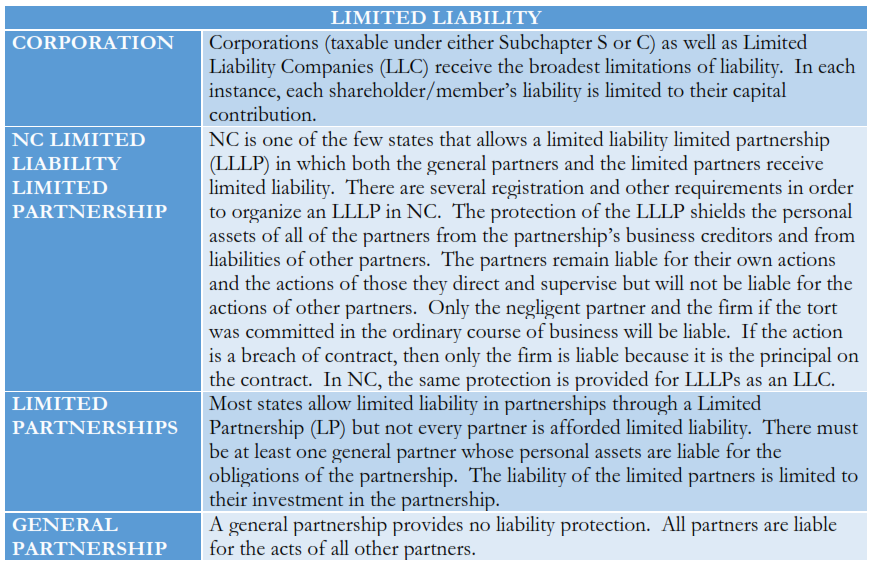
Limited liability is probably the most sought after attribute of business owners forming a new business venture. New business owners wish to protect their personal assets from the claims of business creditors. This can usually be achieved by organizing the venture under a state law that limits the owners’ liability to the amount of capital the owner has invested in the entity. Be very careful when capitalizing the business and applying for loans. Some lenders may require that the owner(s) of the business provide a personal guarantee for the business obligations, thereby making the owner liable to those creditors of the business and defeating the purpose of the limitation of liability.
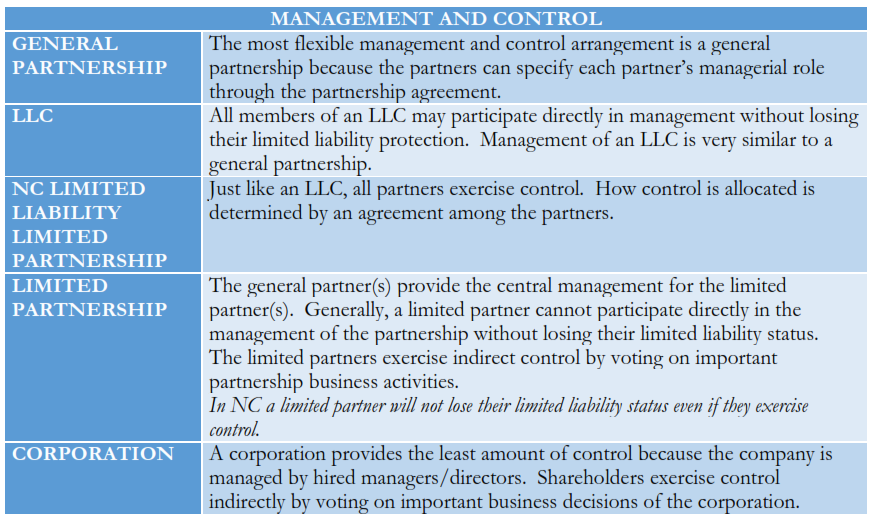
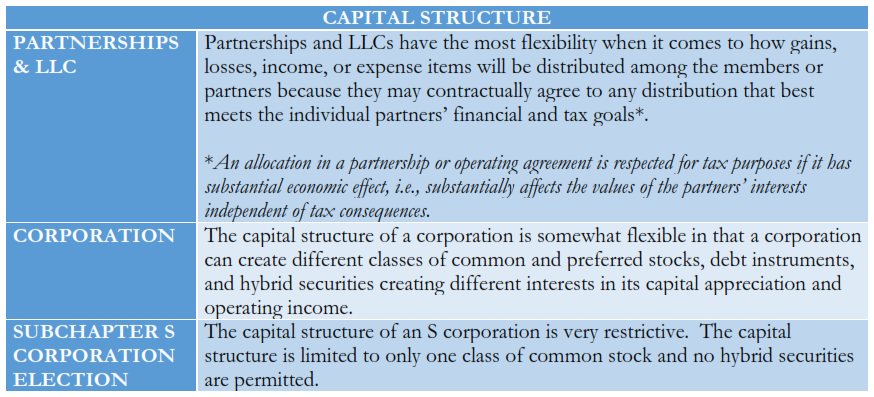
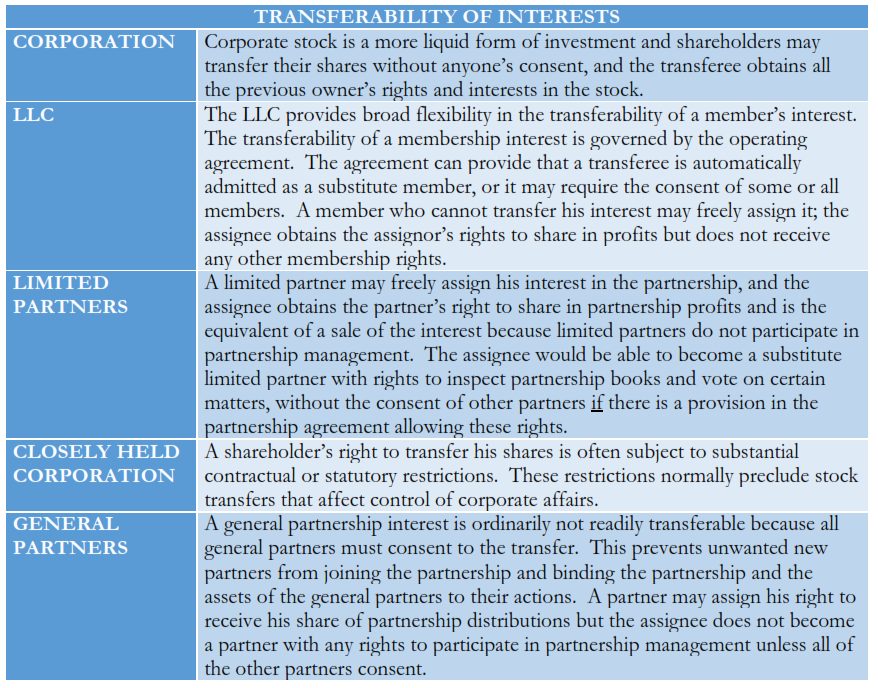
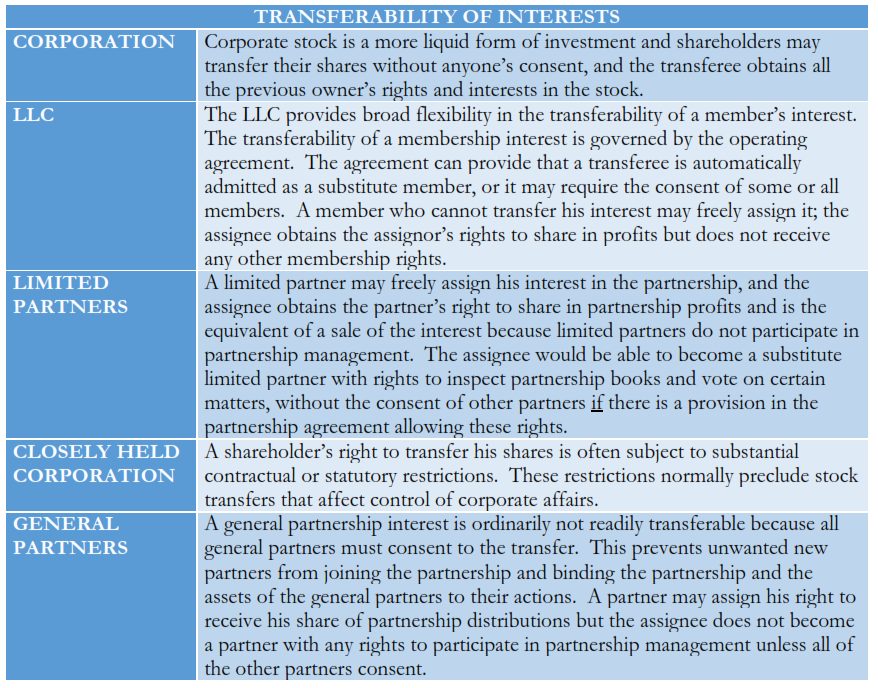
The business lawyers McGrath & Spielberger, PLLC assists clients with all sorts of tax, business, and estate planning matters in North Carolina. Click here to contact us about your tax, business, or estate planning matter today.
Foreclosure Hearing – Mecklenburg County NC – Wells Fargo

Mortgage Loan Servicer / Foreclosing Bank: Wells Fargo; Wells Fargo Bank NA
Prosecuting Trustee / Law Firm: Shapiro & Ingle, LLP
Property Location: Charlotte, Mecklenburg County, North Carolina
Property Type: Primary Residence
Borrower’s Attorney: Jason McGrath, Esq.
Hearing Date: 11/2017
Actions Taken by McGrath & Spielberger on Behalf of Client in Relation to the Foreclosure Hearing: Mr. McGrath attended the foreclosure hearing with the client and negotiated a Motion to Continue to the court in order to help client avoid foreclosure.
Foreclosure Hearing Outcome: Mr. McGrath successfully moved to continue the hearing; foreclosure avoided.
If you are facing home foreclosure Charlotte NC or Mt Pleasant SC, seek assistance from McGrath & Spielberger today. Many homeowners do not know that foreclosures can often be avoided. Our attorneys are here to be your advocate through these tough times and will work to get you the best possible outcome.
Find related helpful resources on our website at
McGrathSpielberger.com/online-resources/helpful-resources/mortgage-loan-and-real-estate-related-resources/
Arbitration Provisions: Law & Venue Video
Arbitration Provisions: Law & Venue
1. Where is the arbitration to take place?
2. What state’s laws apply?
Make sure that the arbitration clause in your contract provides that the arbitration will take place in a specified geographical area (city, county, even state). You’ll also want to have the arbitration clause specifically provide that the laws of a certain state will be applied.
Be careful to protect your interests when drafting the arbitration provisions in your contracts.
North Carolina – A tax friendly place to live and work

If you live in North Carolina (or you’re looking to move here), then a bill recently passed into law by the N.C. Legislature might give you some relief from taxes. The bill was vetoed by Governor Roy Cooper, but the Legislature overrode his veto to pass the bill on June 28, 2017. The new law makes three beneficial changes to the State’s current tax code that you will want to be aware of as a resident (or soon to be resident) of North Carolina. These three changes will become effective as of January 1, 2019, except for the corporate income tax rate as stated below. The bill also set forth a budget plan and created an incentive program to bring new jobs to North Carolina.
(1) Personal Income Tax Rate
The personal income tax rate will drop to 5.25% for a taxpayer’s North Carolina taxable income. The 2017 personal income tax rate is 5.499%.
(2) Corporate Income Tax Rate
The corporate income tax rate will drop to 3% for every C corporation doing business in the State, effective as of January 1, 2017. The corporate income tax rate will drop even further to 2.5% for taxable years beginning January 1, 2019. The current corporate income tax rate is 4%.
 |
| New corporate tax rates may bring about a spring of new business in North Carolina. |
(3) Standard Deduction Increased
Additionally, each filing status will see an increase in the standard deduction.
- Married, filing jointly/surviving spouse $20,000 (currently $17,500)
- Head of Household $15,000 (currently $14,000)
- Single $10,000 (currently $8,750)
- Married, filing separately $10,000 (currently $8,750)
For more information on Attorney Kelly J. Brown, or the other business & contract lawyers at McGrath and Spielberger, PLLC, please visit McGrathSpielberger.com.

Foreclosure Hearing Result – Embrace Home Loans
The following is a summary of a foreclosure hearing that McGrath & Spielberger assisted a borrower with, and is provided for informational purposes only. Each case, each client, each situation is different, and each matter may have a different outcome.
Mortgage Loan Servicer / Foreclosing Bank: Embrace Home Loans, Inc. c/o RoundPoint Mortgage Servicing Corporation
Prosecuting Trustee / Law Firm: Substitute Trustee Services, Inc. and Hutchens Law Firm
Property Location: McDowell County, North Carolina
Property Type: Primary residence
Borrower’s Attorney: Jason A. McGrath, Esq.
Hearing Date: December 2016
Actions Taken by McGrath & Spielberger on Behalf of Client in Relation to the Foreclosure Hearing: Mr. McGrath attended the foreclosure hearing with the client and argued a Motion to Continue to the court in order to help client avoid foreclosure.
Foreclosure Hearing Outcome: Mr. McGrath successfully moved to continue the hearing; foreclosure avoided.

Foreclosure Hearing Outcome – Trustee Services
The following is a summary of a foreclosure hearing that McGrath & Spielberger assisted a borrower with, and is provided for informational purposes only. Each case, each client, each situation is different, and each matter may have a different outcome.
Mortgage Loan Servicer / Foreclosing Bank: Wells Fargo Bank, N.A.
Prosecuting Trustee / Law Firm: Trustee Services of Carolina, LLC and Brock & Scott, PLLC
Property Location: Charlotte, Mecklenburg County, North Carolina
Property Type: Primary residence
Borrower’s Attorney: Jason A. McGrath, Esq.
Hearing Date: August 2015
Actions Taken by McGrath & Spielberger on Behalf of Client in Relation to the Foreclosure Hearing: Mr. McGrath attended the foreclosure hearing with the client and argued a Motion to Continue to the court in order to help client avoid foreclosure.
Foreclosure Hearing Outcome: Mr. McGrath successfully moved to continue the hearing; foreclosure avoided.

Foreclosure Hearing – June – Wells Fargo Bank – Charlotte, NC
The following is a summary of a foreclosure hearing that McGrath & Spielberger assisted a borrower with, and is provided for informational purposes only. Each case, each client, each situation is different, and each matter may have a different outcome.
Mortgage Loan Servicer / Foreclosing Bank: Wells Fargo Bank, N.A.
Prosecuting Trustee / Law Firm: Trustee Services of Carolina, LLC and Brock & Scott, PLLC
Property Location: Charlotte, Mecklenburg County, North Carolina
Property Type: Primary residence
Borrower’s Attorney: Jason A. McGrath, Esq.
Hearing Date: June 2015
Actions Taken by McGrath & Spielberger on Behalf of Client in Relation to the Foreclosure Hearing: Mr. McGrath attended the foreclosure hearing with the client and argued a Motion to Continue to the court in order to help client avoid foreclosure.
Foreclosure Hearing Outcome: Mr. McGrath successfully moved to continue the hearing; foreclosure avoided.
Hearing on Partition of Real Property and Result

The following is a summary of a hearing on Partition of Real Property that McGrath & Spielberger assisted a client with, and is provided for informational purposes only. Each case, each client, each situation is different, and each matter may have a different outcome.
Basic Facts. The Petitioner is trying to force a sale of the real property at issue so she can receive a portion of the sale proceeds.
Basics of the Applicable Law. The default setting in North Carolina law is that an owner of real property (even a minority owner) has a right to force a partition of that property, whether a partition in kind (physical division) or partition by sale (sell the property and divide the proceeds).
The Challenge. To not have the case follow the default setting (a partition being ordered).
Owner 1. The Respondent (Brother) who owns 11/12 of the real property, lives on the property with his family, takes care of the property, pays the taxes, etc.
Owner 2. The Petitioner (Sister), who owns 1/12 of the real property, does not reside there, does not contribute to the care of the property.
Property Location. Charlotte, Mecklenburg County, North Carolina
Property Type. Primary residence
Who McGrath & Spielberger Attorney Jason McGrath Represents. Owner 2, the Respondent
Hearing Date. November, 2016
Actions Taken by McGrath & Spielberger on Behalf of Client in Relation to the Partition Hearing. Mr. McGrath filed Motions to Dismiss and Objections to the Petition for Partition and attended the hearing with the Client. The strategy to oppose the Petition for Partition was not revealed to the other side until necessary at the hearing itself.
Partition Hearing Outcome. Mr. McGrath successfully prevented an Order for Partition from being entered. The case remains pending, as do our Motions to Dismiss.
Arbitration Clause: One Arbitrator Or More?
Attorney Jason McGrath explains some things to consider when when considering the arbitration clause in a contract in this short video.
Here are some of the key points contained in the video:
-
- How many arbitrators would you prefer?
-
- Are you comfortable with the decision being in the hands of just one person? Keep in mind that trial level legal cases in the regular judicial system are handled by one judge.
-
- Keep in mind that the more arbitrators involved, the more expensive arbitration will be.
- Does the arbitration clause in the contract address how many arbitrators there are going to be?
The arbitration provision in a contract doesn’t have to address the issue of how many arbitrators. You can leave the option open if you prefer. You want to be mindful of this when crafting your contract and the arbitration provision.
If you need legal services in North Carolina, South Carolina, Georgia, Florida, Ohio, or Tennessee we invite you to fill out our confidential client form for possible legal assistance.


Foreclosure Hearing – RoundPoint Mortgage Servicing Corporation -NorthCarolina
The following is a summary of a foreclosure hearing that McGrath & Spielberger assisted a borrower with, and is provided for informational purposes only. Each case, each client, each situation is different, and each matter may have a different outcome.
Mortgage Loan Servicer / Foreclosing Bank: RoundPoint Mortgage Servicing Corporation
Prosecuting Trustee / Law Firm: Substitute Trustee Services, Inc. and Hutchens Law Firm
Property Location: Charlotte, Mecklenburg County, North Carolina
Property Type: Primary residence
Borrower’s Attorney: Jason A. McGrath, Esq.
Hearing Date: July 2016
Actions Taken by McGrath & Spielberger on Behalf of Client in Relation to the Foreclosure Hearing: Mr. McGrath attended the foreclosure hearing with the client and argued a Motion to Continue to the court in order to help client avoid foreclosure.
Foreclosure Hearing Outcome: Mr. McGrath successfully moved to continue the hearing; foreclosure avoided.
Foreclosure Hearing – RoundPoint Mortgage Servicing Corp – Charlotte-NC

The following is a summary of a foreclosure hearing that McGrath & Spielberger assisted a borrower with, and is provided for informational purposes only. Each case, each client, each situation is different, and each matter may have a different outcome.
Mortgage Loan Servicer / Foreclosing Bank: RoundPoint Mortgage Servicing Corporation
Prosecuting Trustee / Law Firm: Substitute Trustee Services, Inc. and Hutchens Law Firm
Property Location: Charlotte, Mecklenburg County, North Carolina
Property Type: Primary residence
Borrower’s Attorney: Jason A. McGrath, Esq.
Hearing Date: May 2016
Actions Taken by McGrath & Spielberger on Behalf of Client in Relation to the Foreclosure Hearing: Mr. McGrath attended the foreclosure hearing with the client and argued a Motion to Continue to the court in order to help client avoid foreclosure.
Foreclosure Hearing Outcome: Mr. McGrath successfully moved to continue the hearing; foreclosure avoided.

Foreclosure Hearing – Harrisburg, North Carolina – Rushmore Loan Management Services
The following is a summary of a foreclosure hearing that McGrath & Spielberger assisted a borrower with, and is provided for informational purposes only. Each case, each client, each situation is different, and each matter may have a different outcome.
Mortgage Loan Servicer / Foreclosing Bank: Rushmore Loan Management Services
Prosecuting Trustee / Law Firm: Substitute Trustee Services, Inc. and Hutchens Law Firm
Property Location: Harrisburg, Cabarrus County, North Carolina
Property Type: Primary residence
Borrower’s Attorney: Jason A. McGrath, Esq.
Hearing Date: April 2016
Actions Taken by McGrath & Spielberger on Behalf of Client in Relation to the Foreclosure Hearing: Mr. McGrath attended the foreclosure hearing with the client and argued a Motion to Continue to the court in order to help client avoid foreclosure.
Foreclosure Hearing Outcome: Mr. McGrath successfully moved to continue the hearing; foreclosure avoided.
How Do You “Transfer” Your Company Into North Carolina From Another State?

As a business attorney, one of the most frequent questions I am asked is some variation of “How do I transfer my out-of-state company to North Carolina?” I’ll address the most common scenarios and the reasonable options available. I’m using Florida as the other state just for example purposes (I also practice in FL), but the same general process is true regardless of which state your company originated in or currently exists in.
Scenario A: “I live in Florida, where my company was formed, but I’m moving to North Carolina and going forward I will be doing business out of North Carolina instead of Florida. What should I do and how do I do it?”
Option 1: convert your Florida company into a North Carolina company. NC allows a company formed in another state to convert to become a NC LLC. The company would need to follow the law of the state it is coming from as far as winding down any business and otherwise wrapping up affairs in that state, and would typically need to have passed a resolution or similar approving the conversion to a NC company. The LLC can then file its Articles of Organization/Conversion with the NC Secretary of State.
Option 2: shut your Florida company down and start a new one in North Carolina. You would “wind up” your Florida LLC and dissolve it, such that it no longer exists. While the timing of the steps in North Carolina may vary to some extent, you’d go ahead and create a North Carolina LLC. The name would not have to be the same, but there are advantages to using the same name, if possible (this article does not attempt to address those issues).
Option 3: keep your Florida company open and register it with the State of North Carolina as a foreign business authorized to transact in North Carolina. You’d obtain a “Certificate of Good Standing” or similar from Florida. You then provide that to the NC Secretary of State as part of your North Carolina Application for Certificate of Authority (to conduct business in North Carolina). Assuming you are approved by NC, you’re now good to go to conduct business in both states, or either state, and you can have your principal place of business in either state. You will likely be required to pay annual fees to each state and file taxes in each state, which are important factors to consider.
Option 4: start an affiliated company or subsidiary in North Carolina. In certain specific instances, you may keep your Florida LLC open, and instead of registering it with North Carolina, you’d prefer to create and register a separate but related business entity in North Carolina. This is typically referred to as a “subsidiary” or an “affiliated company”. You will likely be required to pay annual fees to each state and file taxes in each state, which are important factors to consider.
Additional notes. Under any of the above options, you’ll have to have a registered agent with a “continuous presence” in NC. Many law firms (like mine) agree to provide that service for a small annual fee, but your company’s “RA” doesn’t have to be a lawyer or law firm. Of course, we also provide the very services needed to transfer your business overall.
These actions can be accomplished without an attorney, but you should at least consider consulting with an attorney any time you make a significant change to your business entity. Good luck!

Foreclosure Hearing – Rushmore Loan Management Services – Cabarrus County North Carolina
The following is a summary of a foreclosure hearing that McGrath & Spielberger assisted a borrower with, and is provided for informational purposes only. Each case, each client, each situation is different, and each matter may have a different outcome.
Mortgage Loan Servicer / Foreclosing Bank: Rushmore Loan Management Services
Prosecuting Trustee / Law Firm: Substitute Trustee Services, Inc. and Hutchens Law Firm
Property Location: Harrisburg, Cabarrus County, North Carolina
Property Type: Primary residence
Borrower’s Attorney: Jason A. McGrath, Esq.
Hearing Date: March 2016
Actions Taken by McGrath & Spielberger on Behalf of Client in Relation to the Foreclosure Hearing: Mr. McGrath attended the foreclosure hearing with the client and argued a Motion to Continue to the court in order to help client avoid foreclosure.
Foreclosure Hearing Outcome: Mr. McGrath successfully moved to continue the hearing; foreclosure avoided.

Foreclosure Hearing – RoundPoint Mortgage Servicing – Mecklenburg County North Carolina
The following is a summary of a foreclosure hearing that McGrath & Spielberger assisted a borrower with, and is provided for informational purposes only. Each case, each client, each situation is different, and each matter may have a different outcome.
Mortgage Loan Servicer / Foreclosing Bank: RoundPoint Mortgage Servicing Corporation
Prosecuting Trustee / Law Firm: Substitute Trustee Services, Inc. and Hutchens Law Firm
Property Location: Charlotte, Mecklenburg County, North Carolina
Property Type: Primary residence
Borrower’s Attorney: Jason A. McGrath, Esq.
Hearing Date: March 2016
Actions Taken by McGrath & Spielberger on Behalf of Client in Relation to the Foreclosure Hearing: Mr. McGrath attended the foreclosure hearing with the client and argued a Motion to Continue to the court in order to help client avoid foreclosure.
Foreclosure Hearing Outcome: Mr. McGrath successfully moved to continue the hearing; foreclosure avoided.

Foreclosure Hearing Private Lender Cabarrus County North Carolina
The following is a summary of a foreclosure hearing in Cabarrus County, North Carolina that McGrath & Spielberger assisted a borrower with, and is provided for informational purposes only. Each case, each client, each situation is different, and each matter may have a different outcome.
Mortgage Loan Servicer / Foreclosing Bank: Private lender
Prosecuting Trustee / Law Firm: Substitute Trustee Services, Inc. and Hutchens Law Firm
Property Location: Concord, Cabarrus County, North Carolina
Property Type: Primary residence
Borrower’s Attorney: Jason A. McGrath, Esq.
Hearing Date: March 2016
Actions Taken by McGrath & Spielberger on Behalf of Client in Relation to the Foreclosure Hearing: Mr. McGrath attended the foreclosure hearing with the client and argued a Motion to Continue to the court in order to help client avoid foreclosure.
Foreclosure Hearing Outcome: Mr. McGrath successfully moved to continue the hearing; foreclosure avoided.
Requests for Admissions In a Lawsuit
If you are dealing with a lawsuit in North Carolina please fill out our confidential client intake form for legal assistance.
Requests for Production Under NC Rules of Civil Procedure
If you are facing a lawsuit in North Carolina please fill out our confidential client intake form for legal assistance.
Why does your Corporation or Company Need a Registered Agent?
If you are in need of legal assistance for your business in North Carolina, South Carolina, Tennessee, Georgia or Florida please fill out our confidential client intake form.
Legal ‘Claim and Delivery’ Actions in North Carolina

In this video attorney Jason McGrath explains ‘Claim and Delivery’ procedures for North Carolina under the rules of civil procedure.
If you are in need of legal assistance with a Lawsuit in North Carolina, South Carolina, Tennessee, Georgia or Florida please fill out our confidential client intake form.
NC Home Foreclosure Hearings – Should the Borrower Attend?
If you are facing a foreclosure situation in North Carolina please fill out our confidential client intake form for legal assistance.
Kelly Brown Earns LL.M. in Tax Law

to announce that Attorney Kelly J. Brown has
earned her LL.M in Tax Law.
Attorney Kelly J. Brown has earned her LL.M. (Master of Laws) in Taxation from Boston University School of Law. Kelly is licensed in both North Carolina and South Carolina. Her practice focuses on real estate matters, including closings; business law matters; and of course, tax matters.
Post-Foreclosure Deficiency Judgments in NC
Summary Judgment
If you are facing a lawsuit in North Carolina please fill out our confidential client intake form for legal assistance.
Tax Rates on Ordinary Income for Businesses
When you decide to start a business venture, there are a myriad of things to consider. We regularly assist small business owners, especially start-up businesses, walking them through the steps that need to be taken in order to make the business official and legal. There are many ways a business can be organized and there are both non-tax and tax factors as well as state and local statutory requirements that need to be taken into consideration when embarking on this exciting journey of starting a business.
I previously wrote an article regarding the non-tax factors that should be considered when starting a business. This article is one of a series of articles that focuses on the tax implications of certain business activities and things you should consider when choosing your business entity. The most prominent federal tax considerations in choosing a business entity include:
- Capital Contributions
- Ownership Restrictions
- Business Income and Loss
- Allocations of Income or Loss
- Basis Limitations and the Deductibility of Losses
- Distributions
- Employment Tax Considerations
- Tax Rates on Ordinary Income
This article discusses the tax rates for businesses and business owners.
Ordinary Income Tax Rates
For most C corporations that have significant taxable income, the corporate income tax rate is essentially a flat rate of 34-35%. Corporations with smaller amounts of income enjoy lower rates (15-25%) on their first $75,000 of taxable income. As you can see below, a very small number of small businesses will receive the lower tax rates of 15 and 25%.

Additionally, certain personal service corporations (i.e., lawyers, accountants, architects, and the like) are not entitled to graduated tax rates but receive a flat rate of 35%. Individuals pay tax at the graduated rates of 15%, 28%, 31%, 36%, and 39.6%.
With a presidential election fast approaching and presidential hopefuls throwing their hat in the ring, you can expect some campaign talk of tax reform. On the corporate side, Marco Rubio has talked about tax reform that would lower the tax rate for corporations and passthroughs to 25% (although many of the credits and deductions would be eliminated) and allow businesses to expense the cost of their investments 100% in the year of acquisition. On individual tax reform, Rubio proposes reducing the number of individual tax brackets from 7 to 2 (15% and 35%), eliminate the standard deduction and replace it with a refundable personal credit, and create a $2,500 child tax credit.

The relationships among these tax rates can greatly influence the choice of entity. At one time the maximum individual tax rate on ordinary income peaked at 70% and the top corporate tax rate was 46%, making forming a C corporation an attractive option to avoid the higher individual tax rates. The difference in rates prompted most business owners to organize their entities as a corporation rather than a pass-through entity because corporate income was taxed at much lower rates. During these high individual tax rate times, shareholders that wished to withdraw earnings created tax efficient strategies to avoid the double tax (e.g., owner-employees of a C corporation would distribute profits in the form of salary or fringe benefits, which are tax-deductible by the corporation and the fringe benefits are excludable from income of the employee in most situations). Shareholders also loaned money or leased property to C corporations and withdrew earnings from the corporation in the form of rent or interest payments that were tax deductible as well. The IRS began to crack down on these strategies and attacked payments of salary or interest as unreasonable compensation or disguised dividends. Congress fought back by enacting penalties to patrol against excessive accumulations or avoidance of the individual progressive tax rates. It wasn’t hard for a corporation with good tax planning to justify the payment of reasonable compensation and accumulation of earnings on the basis of reasonable business judgment and thereby avoid constructive dividends and the corporate penalty tax.
Now, individuals and corporations are subject to the same top tax rate and dividends and long-term capital gains are both taxed at relatively low rates, the C corporation earnings accumulation strategy is much less compelling. The parity in the individual and corporate tax rates, in conjunction with the prospect of two levels of tax when a C corporation is sold, provides a greater incentive to use a pass-through entity instead of a C corporation, particularly if the business intends to distribute its earnings currently, does not have owners who work for the firm, or holds assets that are likely to appreciate in value over a relatively short time frame. It would not be beneficial to organize a venture that invests in passive assets such as real estate or financial assets to operate as a C corporation because the costs of doing so would be prohibitive in light of the double tax. In some cases, however, C corporations still offer tax savings, especially for businesses able to pay out most of their earnings as compensation to their high-income owners.
For a complete analysis of the tax implications of C Corporations, Partnerships, and S Corporations click here for the Joint Committee on Taxation’s publication entitled “Choice of Business Entity: Present Law and Data Relating to C Corporations, Partnerships, and S Corporations.”
McGrath and Spielberger, PLLC assists clients with all sorts of tax issues, both federal and state (including but not limited to North Carolina and South Carolina). Click here to contact us about your tax matter.
McGrath & Spielberger, PLLC provides legal services in Florida, Georgia, North Carolina, Ohio, South Carolina, and Tennessee, as well as in some Federal courts. The Firm offers full scale representation, as well as limited scope services, as appropriate for the situation. Please be advised that the content on this website is not legal advice, but rather informational, and no attorney-client relationship is formed without the express agreement of this law firm. Thank you.
Servicemembers’ Civil Relief Act and Foreclosures
Mortgage Loan Debt Forgiveness
Is Canceled Mortgage Loan Debt Income that you are Taxed on?
As an attorney with specific tax law knowledge who also works with borrowers to avoid foreclosure and/or to otherwise resolve mortgage loan problems, I deal with short sales, deeds in lieu of foreclosure, loan modifications, and mortgage loan settlements on a regular basis. Borrowers are usually thrilled to be able to get rid of unwanted mortgage debt either through disposing of the property, as part of a discounted pay off which allows them to keep the property, or in the form of a principal reduction as part of a modification. However, the mortgage loan debt canceled as a result of these types of transactions can have negative future tax consequences for the borrower.
North Carolina and South Carolina have different approaches on these matters as far as state income taxes. In most recent years, North Carolina followed the Federal Government’s lead and enacted legislation to exclude Qualified Principal Residence Indebtedness from a taxpayer’s income for state tax purposes. The North Carolina state exclusion expired in 2013 (just like the Federal exclusion), but unlike the Federal Government, North Carolina has not yet extended the exclusion to cover 2014. Thus, as of the date of this writing, the exclusion currently applies to 2014 for purposes of South Carolina state income taxes but not for North Carolina state income taxes (but changes may be taking place within weeks).
The bill was subsequently rewritten by the NC House of Representatives to exclude forgiven debt from income and then passed by the NC House in early March 2015. As it currently stands, a Conference Committee with members from both the Senate and the House was appointed late last week to hash out whether North Carolina will follow the lead of the IRS and allow certain forgiven mortgage loan debt to be excluded from state taxation from the borrower side for certain debt canceled in 2014. Governor McCrory, of course, can sign or refuse to sign whichever version of the bill is presented to him.
In contrast, South Carolina closely resembles the Federal income tax laws with only a few modifications. South Carolina has simplified its tax scheme by deciding to follow the Federal government’s lead on tax laws with any differences expressly stated in the South Carolina statutes. In fact, § 12-6-40(c) of the South Carolina Code of Laws specifically states, “If Internal Revenue Code sections adopted by this State which expired or portions thereof expired on December 31, 2013, are extended, but otherwise not amended, by congressional enactment during 2014, these sections or portions thereof also are extended for South Carolina income tax purposes in the same manner that they are extended for Federal income tax purposes.” Qualified Principal Residence Indebtedness is not mentioned or excluded in the South Carolina Income Tax Act and thus, one can conclude that the retroactive extension of the Mortgage Forgiveness Debt Relief Act of 2007 by the Federal Government allows a borrower in South Carolina to exclude certain forgiven debt for South Carolina state income tax purposes.
In addition to the Qualified Principal Residence Indebtedness exclusion, borrowers, including those in both North Carolina and South Carolina may be able to exclude some or all of forgiven debt from Federal taxation under the IRS’ insolvency exemption. The insolvency exemption allows a taxpayer to exclude canceled or forgiven debt from income if the taxpayer is insolvent. A borrower is insolvent when the total of all the liabilities exceed the fair market value of all the assets immediately before the cancellation of the debt. However, a borrower can only exclude forgiven debt up to the amount he or she was insolvent.
Whatever you do, just make sure you are fully aware of the potential consequences of your mortgage loan resolution; there’s nothing worse than a nasty tax surprise hitting you out of the blue. If you need advice regarding a tax situation, a distressed mortgage loan, or something similar, please don’t hesitate to contact us to speak to an attorney Charlotte NC and Mt Pleasant SC.
Can the HOA (Homeowners’ Association) Foreclose on my Home?
Jason McGrath Interviewed Regarding Internet Security for Law Firms andtheir Clients
Law firms warned to be vigilant against cybercrime – The Charlotte Business Journal
Jan 30, 2015 – The N.C. State Bar released ethics opinions about cybersecurity, and … so they can be more efficient,” says Jason McGrath, partner at McGrath & Spielberger . . . . (click link above for full story or read it below)
Law firms warned to be vigilant against cybercrime
LEGAL INC. SUBSCRIBER CONTENT: Jan 30, 2015, 6:00am EST
Bea Quirk, Contributing Writer
At the Mecklenburg County Bar’s recent monthly luncheon, the speaker, FBI Agent Colleen Moss, told attendees that although small and midsized law firms don’t regard themselves as targets for hackers, they are. As supervisor of the Charlotte Division’s Computer Intrusion Cyber Squad, she knows firsthand the firms’ vulnerability, no matter the size.
“Anytime there’s a large pot of money involved — escrow, a trust — you’re going to be a target,” Moss told the lawyers. “Criminals look for the fastest and quickest way to make the most money possible. If they find any other data that’s usable and sellable on the Internet, that’s fair game, too.”
Hackers aren’t always subtle in their attacks, as seen in a form of malware called ransomware that is gaining popularity. Hackers install a “cryptolock” on a company’s files and won’t provide access until a ransom is paid, says Clark Walton, an attorney at Alexander Ricks. He has a digital forensics consulting business and previously worked in cybersecurity at the Central Intelligence Agency.
Moss and Walton say regularly updating operating systems, firewalls and antivirus software is the best defense.
Email remains the entry point of choice for hackers. Moss says up to 85% of incidents stem from phishing emails — messages that look legitimate that ask the recipient to click on a link or open an attachment. That allows a hacker to install malware that infects the user’s computer — and an entire system.
“These criminals are good at socially engineering emails that look legitimate or are designed to pull at your heart strings,” Moss says.
One such effort surfaced last year, when hackers were found to have penetrated pharmaceutical companies and their outside advisers in banking and law. Emails were written in “flawless English” and tailored to recipients, who were duped into revealing information that allowed hackers to profit in stock trades, The New York Times reported.
Moss says information on a firm’s website and employee Facebook pages can be used to create credible email. Even though employees of law firms are generally aware of the danger, Moss says they still fall for scams offering financial rewards in exchange for providing access to a checking account.
But law firms have a difficult situation to balance. They are businesses and need to respond to emails. They can’t be ignored, even if they appear suspicious. Moss suggests employees contact their IT department, server host or a consultant. She also recommends reporting apparent scams to www.ic3.gov, an information clearinghouse for Internet crime.
If a law firm in North Carolina is hacked, the state’s Identity Theft Protection Act mandates that customers and clients be informed. Moss also hopes a firm will contact the FBI, which might be able to curb additional damage. Doing so also helps the agency track criminals and can increase the public’s awareness of current scams.
Both the state and national bars are aware of the growing problem. The N.C. State Bar released ethics opinions about cybersecurity, and the American Bar Association published a guide to security.
Moss says cybersecurity is often a matter of risk management. Law firms must consider the costs of security and their tolerance for risk. Small firms must do this kind of analysis as their work and communications are increasingly digitized.
“Smaller firms are moving more to technology so they can be more efficient,” says Jason McGrath, partner at McGrath & Spielberger and chair of the Bar committee that organized Moss’ presentation. “You have to invest in security once technology becomes your bread and butter. It’s just common sense.”
Jason McGrath Interviewed by TV Station Regarding BOA Fraud
Former BofA workers claim they received bonuses for foreclosures… – WSOC tv
Jun 17, 2013 – “I’ve seen all of those things that this lawsuit has mentioned. Yes I have,” said Jason McGrath a foreclosure attorney in Charlotte. McGrath helps … (click here to see the TV broadcast story and interview excerpts)
By Blair Miller
CHARLOTTE, N.C. —
Eyewitness News took a closer look at the allegations in the latest lawsuit on Monday night.
The lawsuit against Bank of America lays out some strong accusations. It claims the Charlotte-based bank gave cash bonuses and gift cards to employees who pushed homeowners into foreclosure.
It was the heart of the recession, at a time when many homeowners were looking for help, but on Monday night, according to a new federal lawsuit, former employees claim loan collectors who put customers into foreclosure were rewarded with gift cards to Target and Bed, Bath and Beyond.
The suit said those who would put at least 10 customers into foreclosure would get $500 bonuses.
According to Bloomberg, ex-Bank of America employees said mortgage workers falsified records and were told to delay applications for government loan assistance by asking customers to fill out paperwork that had already been received.
“I’ve seen all of those things that this lawsuit has mentioned. Yes I have,” said Jason McGrath a foreclosure attorney in Charlotte. McGrath helps clients save their homes.
He said on Monday night that he works with Bank of America often and he is glad that the public is hearing the claims.
“It’s one of those things that it’s great for folks like me because we experience this on a day-to-day basis and we are finally glad to see it see the light of day,” said McGrath.
On Monday night, in a statement to Eyewitness News about the lawsuit, Bank of America said, “These attorneys are painting a false picture of the bank’s practices and the dedication of our employees. While we will address the declarations in more depth when we fire out opposition to the plaintiff’s motion next month, suffice it is to say that each of the declarations is rife with factual inaccuracies.”
McGrath said in some ways the lawsuit helps his clients.
“Some of my clients say I’m so glad to hear you tell me other people are going through this and it’s not just me. They feel much more persecuted. It’s weird since they feel better that other people are going through this as well,” he said.
Seven former loan employees are pushing to get the lawsuit approved for class-action status.
᠃
Jason McGrath Quoted in Story About Pace of Foreclosures
Charlotte-area Foreclosure Filings Decline 16%
By Showcase Realty On October 14, 2014
droberts@charlotteobserver.com
Posted: Thursday, Sep. 12, 2013
Charlotte-area foreclosure filings dropped 16 percent in August from a year ago, as they also fell across the U.S.
The Charlotte region had 982 filings – which comprise default notices, scheduled auctions and bank repossessions – down from 1,166 a year ago. North Carolina filings fell to 2,361, a decline of 12 percent.
Nationwide, foreclosure activity fell largely as a result of fewer properties starting the foreclosure process, according to real estate data firm RealtyTrac. U.S. foreclosure starts dropped to 55,775, their lowest level since December 2005.
For Charlotte, it was the third month in a row of year-over-year declines.Observers point to at least two trends driving down Charlotte foreclosure filings: Rising home prices are increasing equity in homes that are “underwater,” making the owners less likely to allow their properties to fall into foreclosure. Also, they say, some lenders are opting to sell distressed Charlotte-area homes to investors.
“Some of the institutions don’t really want to be in the foreclosure business, so they unload some of their notes that are in default, or nonperforming notes, they call them,” said Nancy Braun, owner of Charlotte-based Showcase Realty.“They sell them to investors at a fraction of the value,” she said. “The investors then can take on the unpleasantries of possibly foreclosing on the party or renegotiating the note with the borrower or doing a short sale with the borrower.”
In Charlotte, investors such as private equity firms have been snapping up bank-owned properties to convert them into rentals. Braun said investor purchases are a factor in Charlotte’s tight inventory situation.
“That’s part of the reason … there’s a shortage of inventory,” she said.
Charlotte’s drop in foreclosures also coincides with home prices increasing here and elsewhere. On Tuesday, the Charlotte Regional Realtor Association reported the average home price in the region rose to $237,635 in August, the largest year-over-year gain so far in 2013. That’s up 11 percent from $213,846 in August 2012.
Home prices are rising across the U.S. as mortgage rates increase and supplies of homes for sale remain tight in many areas. RealtyTrac says the increase in prices is good news for homeowners who are underwater – those who owe more on their homes than they are worth. Those owners have more equity as prices overall rise.
Foreclosure filings in Charlotte remain below their peak of 2,141 in August 2009.
Even though overall filings fell in the Charlotte region, bank repossessions and default notices increased year over year in August, RealtyTrac said. Repossessions climbed 33 percent to 330 properties, compared with 249 properties a year ago. Default notices increased 1,620 percent, to 172 from 10 a year ago.
‘Desperate homeowners’
While overall foreclosure filings are down, Charlotte homeowners who have already fallen into foreclosure are still battling their lenders.
Jason McGrath, a Charlotte-based lawyer who defends struggling homeowners, said his office, in roughly the past few months, has seen an increase in demand from clients facing foreclosure hearings that are only a week or two away or whose homes are already scheduled for foreclosure sales.
“There are clearly many desperate homeowners out there that are still facing foreclosure and are still struggling to make every effort they can to avoid it,” he said.
Despite the falling number of foreclosure filings, some predict a surge in foreclosures in coming months.
Daren Blomquist, vice president for RealtyTrac, said foreclosures are expected to rise in some U.S. markets as lenders move forward with foreclosure starts that had been delayed.
McGrath expects an increase in Charlotte, too.
“There’s some theory out there that we’re going to see a ramp up in foreclosure filings in 2014,” he said.
Source: http://www.charlotteobserver.com/2013/09/12/4306203/charlotte-area-foreclosure-filings.html
᠃
Jason McGrath Reappointed to City of Charlotte’s Civil Service Board and Remains Chair
Attorney Jason McGrath of McGrath & Spielberger, who serves as the Chair of the City of Charlotte Civil Service Board, was recently reappointed to the Board for another three year term. The Board has certain quasi-judicial authority over Charlotte Mecklenburg Police Department and Charlotte Fire Department.
Jason McGrath Quoted in Story About NASCAR Hall of Fame Loans
Investing in NASCAR: What Could Go Wrong?
SAM STURGIS JAN 12, 2015
Charlotte’s NASCAR Hall of Fame crashed hard. As the city preps for an $18 million debt-forgiveness vote, homeowners wonder where their bailouts are.
 |
| A beautiful disaster. (Flickr/Daniel Lobo) |
We just rang in 2015, but the city of Charlotte, North Carolina, would love to see the calendar flipped back to 2005.
That was the year NASCAR cemented its position as one of the United States’ most popular sports. Fortune magazine drooled over the racing juggernaut a decade ago, proudly declaring NASCAR “the fastest-growing, best-run sports business in America—with the emphasis on businesses.”
But the financial viability of NASCAR has crashed in recent years amid plummeting race attendance and growing disinterest in car racing among Americans. And nothing symbolizes the sport’s tragic decline more than its Hall of Fame, which broke ground with great expectations in 2007 and officially opened in 2010—and is now hemorrhaging money for the city of Charlotte.
Monday night, Charlotte’s city council is expected to pass a loan-forgiveness deal that will eliminate nearly $18 million in debt the city owes on the NASCAR Hall of Fame. Opening the glitzy development cost the city $200 million, but the project was viewed as a crucial job creator for downtown Charlotte, undergoing noticeable revival. Today, to call the NASCAR Hall of Fame a financial disaster would be an understatement.
 |
| The NASCAR Hall of Fame, under construction in 2007, features a 278-seat theater, meeting halls, and a cafe. (Flickr/James Willamor) |
Early projections had the city-owned Hall of Fame pulling in revenues of up to $1 million annually. Instead, according to Sporting News, the venue has lost over $5 million since opening. Attendance is abysmal. Developers expected at least 400,000 visitors annually, with the potential to attract up to 800,000. Over the past five years, however, only about 170,000 NASCAR fans have visited the venue each year, or 470 per day. One official representing the NASCAR Hall of Fame acknowledges some financial projections have not been met, but insists, “the Hall is doing well.” Tom Murray, CEO of the Charlotte Regional Visitors Authority, which overseas large city-owned assets, says the NASCAR Hall of Fame will earn money or break even if the debt deal is agreed upon.
City officials are framing today’s debt deal as a “restructuring” rather than a bailout. Yet, as highlighted by a recent Charlotte Observer editorial, the project’s downfall can’t really be spun:
It doesn’t camouflage that the Hall of Fame couldn’t survive on its own. It doesn’t change the fact that the city, when it bid for the hall, miscalculated everything from attendance projections to the arc of NASCAR’s popularity.
The failure of the deal becomes even more clear as cities struggle to pull out of the Great Recession. Charlotte was spared the crippling housing crisis that hit cities like Detroit and Las Vegas. Still, North Carolina’s largest metro was hit hard, according to the Brookings Institution. Single-family properties financed with a mortgage lost 23 percent of their value during the recession and, despite a marginal recovery, are still nowhere near pre-recession rates.
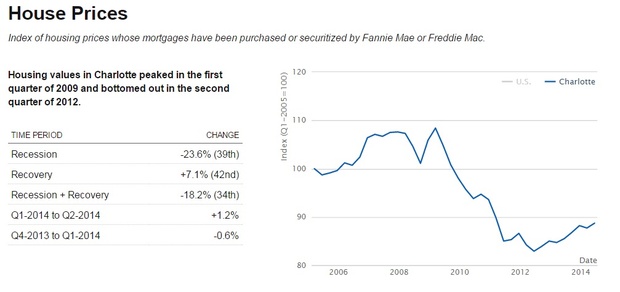 |
| (Brookings) |
Jason McGrath, a Charlotte attorney experienced in real-estate litigation, says the community’s support for the debt-forgiveness deal is “mixed.” Given how badly the venue has underdelivered, taxpayers naturally balk at wiping its financial slate clean so easily. However, McGrath says, residents know they are likely to benefit, at least indirectly, if the city’s debt toward the project is written off. (McGrath chairs a civil service committee for the city, but spoke to CityLab from the perspective as an independent lawyer).
“Of course, the folks that are facing foreclosure and have not been able to get help are looking at this and likely thinking to themselves, ‘Well, here we go again,’ where it’s always the big fish that seem to get the big breaks,” McGrath says.
Nearly 16,000 foreclosed properties in Charlotte are either for sale or auction, according to RealyTrac, an online housing database. Would the $18 million being written off for the NASCAR Hall of Fame have better served residential properties currently underwater?
Jason McGrath Quoted in Charlotte Observer Story on Mortgage Relief Tax Issues
Tax-change renewal could hurt troubled homeowners in North Carolina
North Carolina lawmakers are poised to renew a rule requiring homeowners to pay state income taxes on mortgage debt forgiven by lenders – a move that could cost some homeowners thousands of dollars in additional taxes.
For years, North Carolina allowed taxpayers not to count written-off mortgage debt as taxable income after Congress, responding to the mortgage crisis, enacted a similar exclusion on federal income taxes.
In 2013, North Carolina took away the exclusion for the first time since the crisis. And last week the N.C. Senate passed a bill that would not allow the exclusion for tax year 2014. The House is expected to vote on the measure this week.
To illustrate what the bill would mean, if a homeowner received $20,000 in mortgage principal forgiveness, he or she would have to pay $1,160 in additional taxes, based on the state’s individual income tax rate of 5.8 percent. If $40,000 were forgiven, he or she would owe $2,320 in additional taxes.
Analysts say the proposal, which is included in a bill changing the state’s gasoline tax, could affect as many as 4,000 N.C. homeowners caught up in the mortgage crisis.
Republican and Democratic lawmakers are divided on the proposal, which General Assembly staffers estimate will bring in about $14 million in 2014 tax revenue.
Republicans say the move would be consistent with other tax changes that have lowered rates and eliminated many deductions.
But Democrats and some consumer advocates say it would hurt homeowners struggling to recover after falling into foreclosure and defeat the purpose of a lender providing the debt relief in the first place.
“This is not a good policy,” said Al Ripley, director of consumer and housing affairs for the North Carolina Justice Center. “We want to try to create situations where they will be able to afford to stay in their house … not engage in policies that will take resources away from those families and make it more likely that they will end up in foreclosure or face other economic hardship.”
Taxpayers can still claim the exclusion on 2014 federal income taxes after President Barack Obama signed an extension in December. The exclusion stems from the Mortgage Debt Relief Act of 2007.
As recently as two years ago, North Carolina was one of seven states not allowing taxpayers to exclude canceled mortgage debt from taxable income, according to a study by H&R Block.
The N.C. Department of Revenue said it is still compiling data for tax year 2013 and does not know how much additional tax revenue the state collected on canceled mortgage debt that year.
Lawmakers divided
The proposal to not allow the exclusion prompted a passionate debate in the N.C. Senate on Thursday. Among other tax changes in the bill is the loss of a taxpayers’ deduction of college tuition expenses.
Together, the changes are expected to mean an additional $73 million in state revenue.
Republican Sen. Harry Brown of Onslow County said not having that revenue would hurt working families.
“What you’re talking about is 70-some million of revenue that the state would have to come up with …” said Brown, co-chair of the Senate Appropriations Committee. “Are you going to take it from teachers? … Or Health and Human Services? Or the court system? That should be part of the argument.”
Senate Finance Committee Chairman Bob Rucho, a Matthews Republican, said lawmakers are seeking the changes to be consistent with other tax changes that have lowered rates and eliminated many deductions.
“We just feel like consistency is important,” Brown said later. “It’s pretty much aligned with our tax reform. We think driving the rates down will serve (the middle class) in the long run.”
But Senate Minority Leader Dan Blue of Raleigh said the bill means that “we kick people while they’re down.
“If they had money they wouldn’t be in foreclosure,” he told colleagues. “What we’re doing is saying you have to come up with money because you managed to get the mortgage company to forgive this loan. You’re wrapping something around their neck probably for the rest of their lives.”
Democratic Sen. Joel Ford of Charlotte said in a $21 billion state budget, Republicans could make up for the revenue elsewhere.
“We just need to prioritize working families rather than corporations and special interests,” he said. “You mean to tell me you folks can’t find ($73 million) for the working families of North Carolina? If you can’t find it you should be ashamed of yourselves.”
Bart Hildreth, executive director for the Washington, D.C.-based National Tax Association, said it’s appropriate for state legislatures to take a second look at tax policies, such as those put in place in response to the mortgage crisis.
“Policy experts typically recommend that states revisit each of those periodically to see if they’re still meeting public policy goals,” he said. “You don’t want it all to be on autopilot.”
N.C. foreclosures still high
The proposal comes at a time when foreclosure activity in North Carolina and Charlotte remains higher than in much of the U.S.
According to a report released Thursday by data firm RealtyTrac, one in every 711 housing units in the Charlotte region had a foreclosure filing in January, the 35th-highest rate in the U.S. among 213 metro areas. North Carolina posted the 14th-highest rate: one filing for every 1,044 housing units.
The proposal also comes as Bank of America is just starting to provide $7 billion in consumer relief nationwide as part of its $17 billion settlement with the U.S. government announced last year. Some of that relief is expected to take the form of principal reductions on mortgage loans.
Bank of America spokesman Dan Frahm said the bank has forgiven more than $164 million in principal on 3,600 home loans in North Carolina since 2008. The average amount forgiven over that period is nearly $45,000, he said.
Jason McGrath, a Charlotte-based attorney who works with clients dealing with mortgage disputes and foreclosures, said that while foreclosure activity is falling nationwide and locally, many homeowners are still fighting to keep their homes.
“My firm is as busy as we have ever been with regard to those kinds of cases,” he said. “The overall numbers may be down, but it’s still very much an ongoing issue.”
He said some homeowners might pass up an offer of mortgage relief that could give them much-needed assistance because of the increase in taxes the homeowners might have to pay later.
“It certainly can be part of a self-defeating process” to forgive mortgage debt only to tax consumers on that aid, “smacking them on the back end.”
http://nchousing.org/housing-matters-newsletter/archives/
Mortgage Loan Loss Mitigation Application – Financial Ratios – Be Careful
These applications are referred to by various names, such as the “Request for Modification and Affidavit” (“RMA”), the “710 Form”, and the “Uniform Borrower Assistance Form”. Regardless of what it’s called, or even if the information is being provided verbally, gross monthly income (“GMI”) and the total monthly expenses (“TME”) have to be provided accurately but also with an understanding of what can, and what should, be included and excluded. If you think the loan servicer is going to advise you properly on this, or if you think it’s a no-brainer, you’re almost definitely wrong. Also, did you know that it may not only be the borrower’s income which can be considered…?
NC LLC Operating Agreements Even More Important Due to Changes in North Carolina Law
Legal Advice on Problems in Business Contracts: Strategic Thinking Versus Knee Jerk Reaction
Strategic Thinking / What Does Your Attorney Advise You?
In this video, attorney Jason McGrath discusses how a business law attorney can – or should – handle mistakes and other problems found in contracts. The approach Mr. McGrath discusses is not the obvious one.
Does your business attorney think it through in depth, considering the bigger picture, and employ strategic thinking or just go with the standard, knee-jerk reaction when (s)he renders you advice?
Is the Advice You’re Getting Specific to North Carolina’s Unique Foreclosure Laws?
North Carolina Foreclosures
(Alternative Title: Some Dude in CaliforniaFloridaNevada Wrote it on the Internet, so it Must be Right)
In this video, Jason McGrath, attorney Charlotte NC, discusses the fact that many persons involved in a foreclosure or mortgage loan dispute, or involved in a mortgage relief / loss mitigation situation, turn to the internet or some “unofficial source” for information and/or sign up with some out of state organization or “law firm” for help. So while your Florida based “mortgage relief specialist” or your “national network of attorneys” headquartered in California may not (or may) be scamming you, do they actually understand NC’s laws and process and customize their advice and services accordingly?
Are Negative Reviews Really Bad for Business?
If properly handled, negative reviews can provide a business with an opportunity to actually boost its reputation.
With the surge of digital media and the growing use of social media, it has become extremely easy for both businesses and consumers to reach a captive worldwide audience at little to no time or expense. Social media has helped drive many protests, actions in support, and boycotts in just a small amount of time. This ease of access and use of social media could severely damage a business’ livelihood if the reviews or messages are negative and not addressed appropriately.
There are several considerations that should be made when deciding whether to respond to a negative review. For instance,
-
- Does the review contain opinion, “facts,” or both?
-
- Whether to contact the person who wrote the negative review.
-
- Communicating with the company or website which hosts or published the troublesome response.
-
- Publicly responding to negative online reviews.
- Turn a negative into a positive, or at least an opportunity.
Another consideration offered by Yelp when deciding whether to respond is to determine if the review contains constructive criticism or is just undeniably negative. The appropriate response for the business depends on this classification. If the review is extremely negative and uses colorful language, it may be best to be left alone as nothing constructive could arise when emotions are involved. When emotions are involved it will be difficult to change the person’s mind or sufficiently correct – in their subjective eyes – the problem.

It is also important to look at reviews of other customers. If there are more positive reviews than negative, the negative may not affect whether a future customer decides to purchase the business’ product or service. For example, when I am deciding whether to make a purchase, I examine the online reviews. I look to both negative and positive reviews but I only give sufficient credibility to those reviews that provide constructive feedback instead of generalizations because I want to know if the reviewers’ standards are similar to my own. Further, some persons are suspicious of any business which has, for example, 20 reviews, all of which are positive, or all of which are “5 out of 5 stars” – that does not seem realistic to many of us.
Once the business determines that the review warrants a response, then a very effective way to neutralize the negativity is to publicly respond to the review. A public response shows that the business is concerned that the customer was not completely satisfied with the purchase and would like to remedy the situation. This will show other present and future consumers that the business cares about customer satisfaction and is willing to go to significant efforts to remedy any dissatisfaction. It also shows that the business knows about the deficiency and the deficiency should be remedied going forward.
In the public response, the business should never get defensive or place blame because no one is perfect and it is impossible to satisfy everyone. There is always going to be criticism, it is how the business handles the criticism that affects its reputation and possibly its bottom line as well. Reaching out and offering solutions to customers is a way to not only boost customer satisfaction but it is a way to boost brand loyalty and neutralize any negative reviews.
Additionally, to facilitate helpful reviews, the business could provide discounts, rewards, or other benefits to the reviewers that provide the most comprehensive or helpful information which may benefit future purchasers in making buying decisions. One way that a business that I have dealt with personally has succeeded in encouraging reviews is by providing the product along with a free sample of other products they supply. Then, they sent a separate request and asked that I provide an online review and if I was dissatisfied to contact the business immediately so that any problems could be resolved expediently.
All in all, the best way to respond to a negative is with something positive. There is an old saying which states that “you can attract more flies with honey than vinegar.” That rings true not only when trying to convince someone to do the things you want them to do, but also to neutralize negative experiences. The best form of advertising is personal experience and word of mouth (whether verbal or via the internet). If you can turn someone’s negative personal experience into a positive by remedying the situation, you may have just turned a loss into a gain.
(Part 5) 5 Considerations as to Your Business’ Negative Internet Review
As attorneys with a law firm which has a significant online presence, and as lawyers who represent small and medium businesses, we are very much aware of the power of the online review and/or rating given by consumers. In fact, in this day and age, the positive or negative nature of a company’s reputation as declared by the internet can make or break your business.
For many businesses, it is almost impossible to avoid at least the occasional negative comment or even merely a lukewarm review. Many times, the information posted online is not accurate, or at least is presented out of context and/or incomplete. All businesses which encounter this face the same question: what can we do about this negative online review? Hopefully, after you have had a bit of time to think about it, one of your next questions is: what should we do about this negative online review? We have developed a list of 5 key considerations and here is the fifth.
(5) Turn a negative into a positive, or at least into an opportunity. This can’t work in all industries or all situations, of course, but what about turning the criticism into a promotional effort? For example, let’s consider the complaint of “I had to wait more than 30 minutes for my car to be cleaned at Acme Car Wash.” Perhaps the response from Acme is similar to this: “We regret you had to wait so long, but we were simply very busy that day with so many customers who know what a good job we do. Everyone should know that this month we have a 25% discount for our Premium Customer Club memberships, which allow you to make an appointment, among other benefits!”
This creative approach focuses on the positive, while still “apologizing” to the unhappy customer. It might even increase business. Find the silver lining.
(Part 4) 5 Considerations as to Your Business’ Negative Internet Review
As attorneys with a law firm which has a significant online presence, and as lawyers who represent small and medium businesses, we are very much aware of the power of the online review and/or rating given by consumers. In fact, in this day and age, the positive or negative nature of a company’s reputation as declared by the internet can make or break your business.

For many businesses, it is almost impossible to avoid at least the occasional negative comment or even merely a lukewarm review. Many times, the information posted online is not accurate, or at least is presented out of context and/or incomplete. All businesses which encounter this face the same question: what can we do about this negative online review? Hopefully, after you have had a bit of time to think about it, one of your next questions is: what should we do about this negative online review? We have developed a list of 5 key considerations and here is the fourth.
(4) Publicly responding to the negative online review. Some business owners will post a response if the hosting website allows the same/has a mechanism in place. Again, you would want to be very careful in taking this approach, would want to take numerous deep breaths before writing the response, and would want to have at least one other rational person review your response before submitting. There is a definite split of opinions as to how to execute this approach, and of course each situation can be different. If you are going to respond:
- should the response be general or detailed?
- should the response be apologetic or more of a rebuttal or defense?
- should the response contain the name, or at least the position, of the person writing it on behalf of the business?
- should the response invite the complainer to call the business to further discuss?
In my personal experience, most of the responses I see written by business owners are fairly neutral and contain sort of a non-apology apology – you know, the kind that athletes’ public relations representatives write for them, something like “I am sorry if anyone was offended by . . . .”
The bottom line is that if you are going to respond, be very careful. Some of the folks out there, referred to as “trolls” in today’s internet world, will gleefully jump on any response, no matter how well-intentioned, just to up the ante and further stir the pot. Good luck.
(Part 3) 5 Considerations as to Your Business’ Negative Internet Review
As attorneys with a law firm which has a significant online presence, and as lawyers who represent small and medium businesses, we are very much aware of the power of the online review and/or rating given by consumers. In fact, in this day and age, the positive or negative nature of a company’s reputation as declared by the internet can make or break your business.
For many businesses, it is almost impossible to avoid at least the occasional negative comment or even merely a lukewarm review. Many times, the information posted online is not accurate, or at least is presented out of context and/or incomplete. All businesses which encounter this face the same question: what can we do about this negative online review? Hopefully, after you have had a bit of time to think about it, one of your next questions is: what should we do about this negative online review? We have developed a list of 5 key considerations and here is the third.
(3) Communicating with the company or website which hosts or published the troublesome review. This can be productive and worthwhile and is unlikely to have negative consequences. In our experience most review sites do make an effort to act professionally, but understandably it is impossible to manage the hundreds, thousands or tens of thousands reviews that the website may ultimately contain. If you – or your representative/attorney try hard enough, you can likely get someone’s attention and perhaps even instigate an investigation of the review.
Some reviews violate the posting company’s terms of service. Others may end up being removed if the publishing website cannot verify the legitimacy of the review. Another common occurrence leading to a deletion is if the person writing the review cannot be identified or at least confirmed as having truly been a customer or client. Finally, sometimes the entity hosting the review’s content or publishing it will remove it if an investigation leads to a conclusion that the review is incorrect or unfair.
Oh, and we should mention one other scenario, since, after all, we are lawyers . . . the threat of legal action may make such a review go away, independent of the factors above.



